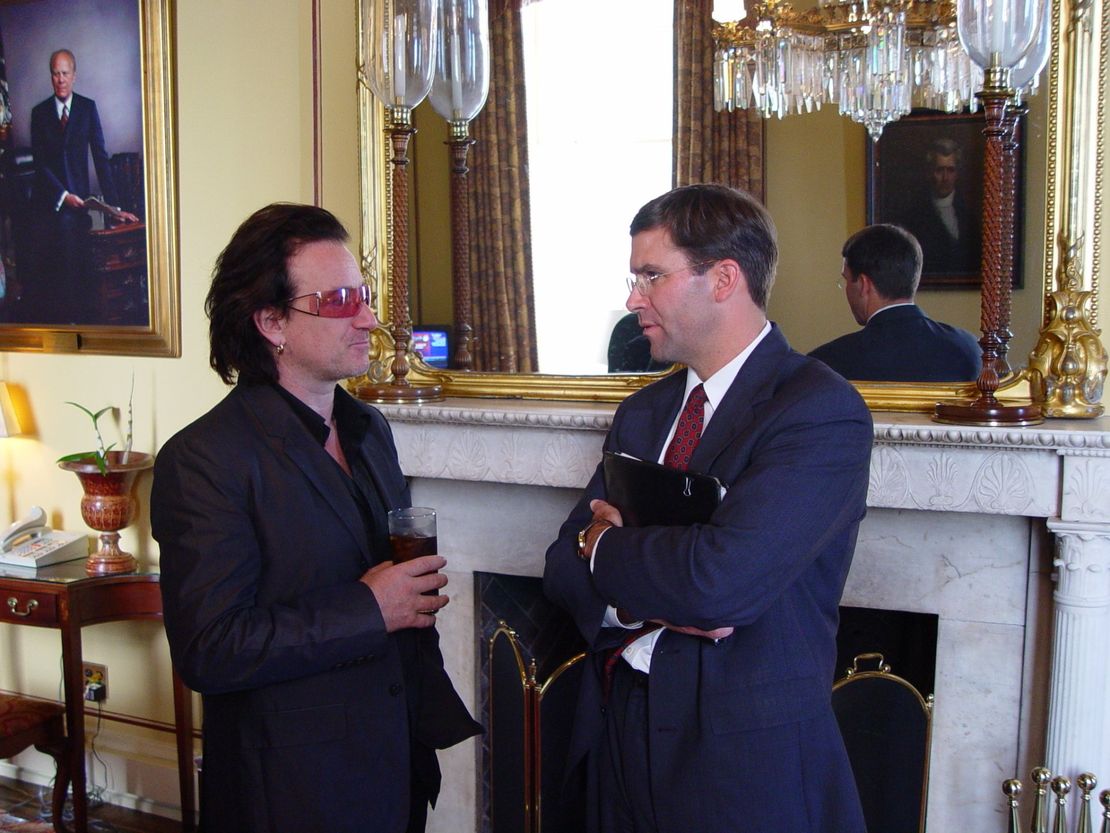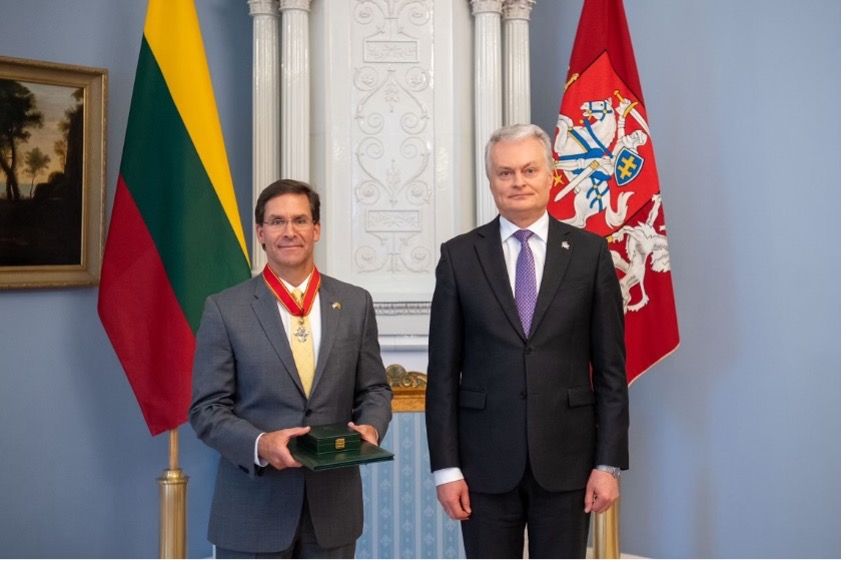about dr. mark t. Esper
Dr. Mark T. Esper became the 27th Secretary of Defense in July 2019 when he was confirmed in an overwhelming 90-8 vote by the U.S. Senate in rare bipartisan fashion. Esper went on to successfully lead the Defense Department through an unprecedented time in the nation’s history: from conflict with Iran, an ongoing military campaign in Afghanistan, and counter-terrorism operations in the Middle East; to open competition with China and Russia amidst a fundamental shift in the geo-strategic environment; and from the greatest civil unrest and political turmoil America has seen in decades, to a major recession and the spread of a global pandemic the world had not experienced in over 100 years, all while dealing with an unpredictable White House.
As Defense Secretary, Esper was responsible for ensuring the United States’ national security, protecting the American people at home and abroad, and advancing the country’s interests globally. In this capacity, he led the largest and most complex organization in the world given its nearly three million service members and defense civilians, $740 billion annual budget, and trillions of dollars of weapons, equipment, and infrastructure located at 4,800 sites in over 160 countries. Esper’s broad scope of responsibilities ranged from organizing, manning, training, and equipping the joint force, to the research and development of future weapons, concepts, and equipment; and from defense trade, diplomacy, and cybersecurity, to healthcare, hospitals, housing, and schools.
Dr. Esper made major strides in shaping and implementing the National Defense Strategy, which called for a return to preparing for high intensity conflict in a new era of great power competition principally against China and Russia. To this end, Esper established the Space Force and Space Command, proposed a dramatic change in the size and composition of the U.S. Navy, enhanced the resourcing and operations of Cyber Command, and led a major reform effort that reorganized the department and freed up billions of dollars for higher priorities. He worked hard to strengthen alliances and grow new partners, especially in the Indo-Pacific and Europe, and helped drive a major increase in the readiness and capability of NATO members, all while advancing new warfighting, operational, and readiness concepts in the U.S. military.
Esper also oversaw the largest R&D budget in the department’s history, drove spending on cutting-edge technologies such as Artificial Intelligence, directed energy, advanced networking, robotics, and hypersonics, and launched the biggest initiative in decades to improve diversity and inclusion in the armed forces.
Prior to becoming Defense Secretary, Dr. Esper served as the 23rd Secretary of the Army from November 2017 until June 2019. In this capacity, he was responsible for over 1.5 million active, Guard, and Reserve Soldiers and Army civilians, a budget of $180 billion annually, and all aspects of leading the world’s most capable ground combat force. During his tenure, Esper launched a renaissance in how the Service organized, manned, trained, and equipped the force as it shifted its focus back toward large-scale combat operations against great power competitors.
Dr. Esper was a reformer who spearheaded an extensive review process dubbed “night court” that reduced organizational inefficiencies and eliminated scores of programs to free up funding for critical modernization initiatives. He also established a new U.S. Army Futures Command designed to improve the Army’s acquisition process and bolster its broader effort to field a modern force capable of fighting in all domains. Finally, he directed an overhaul of Army recruiting standards and processes, the lengthening and toughening of Infantry Basic Combat Training, and the development of a new Talent Management system for the service, all while advancing important initiatives for Army spouses and families.
Early Life and Education
Mark Esper was born in April 1964 in Uniontown, Pennsylvania – a small coal mining town 46 miles southeast of Pittsburgh. He is the son of Pauline "Polly" Reagan, a homemaker whose family traces its Irish roots back to County Cork in Ireland; and the late Thomas Esper, a welfare caseworker for the state whose parents emigrated from Lebanon at the beginning of the 20th century. Esper has three younger sisters: Patty Ann, Donna, and Beth Anne.

Slide title
Esper heading outside for a morning workout in 1965
Button
Slide title
Esper having lunch in uniform with his sister Patty Ann in 1968
Button
Esper graduated from Laurel Highlands High School outside Uniontown in 1982. During high school he was a B+/A- student; a multi-year letterman in Football, Basketball, and Track; a member of the student government and various clubs; a top student in AP History, AP English, and Senior Reading; and was voted “Most Likely to Succeed” by his classmates. In 2013, Esper was one of six former graduates that year to be inducted into the Laurel Highlands High School Hall of Fame.

Slide title
Esper on highschool graduation day with his parents, grandmother, and sister
Button
Slide title
Esper in his senior year football photo
Button
In July 1982, Esper became a cadet at the United States Military Academy. During his time at West Point, he was a Dean’s List student and member of the Tae Kwan Do and Judo teams. He was also a member of the Cadet Tactics (aka “Ranger”) Club, later becoming its president, and the Mountaineering Club. In his senior year, Esper founded and led the Cadet Silent Drill Team. In 1983, Esper competed for and was chosen as one of ten cadets to attend an abridged version of Navy SEAL training in Coronado, California for the summer of 1984. The course was later cancelled, prompting Esper to attend Airborne School at Fort Benning, Georgia, that summer, followed by a month-long assignment as a “third lieutenant” in the 82d Airborne Division at Fort Bragg, North Carolina. In the following Spring of 1986, he earned his British Army Parachute Wings during training at the Royal Military Academy Sandhurst in the United Kingdom as part of a Tactics Club overseas trip he led.
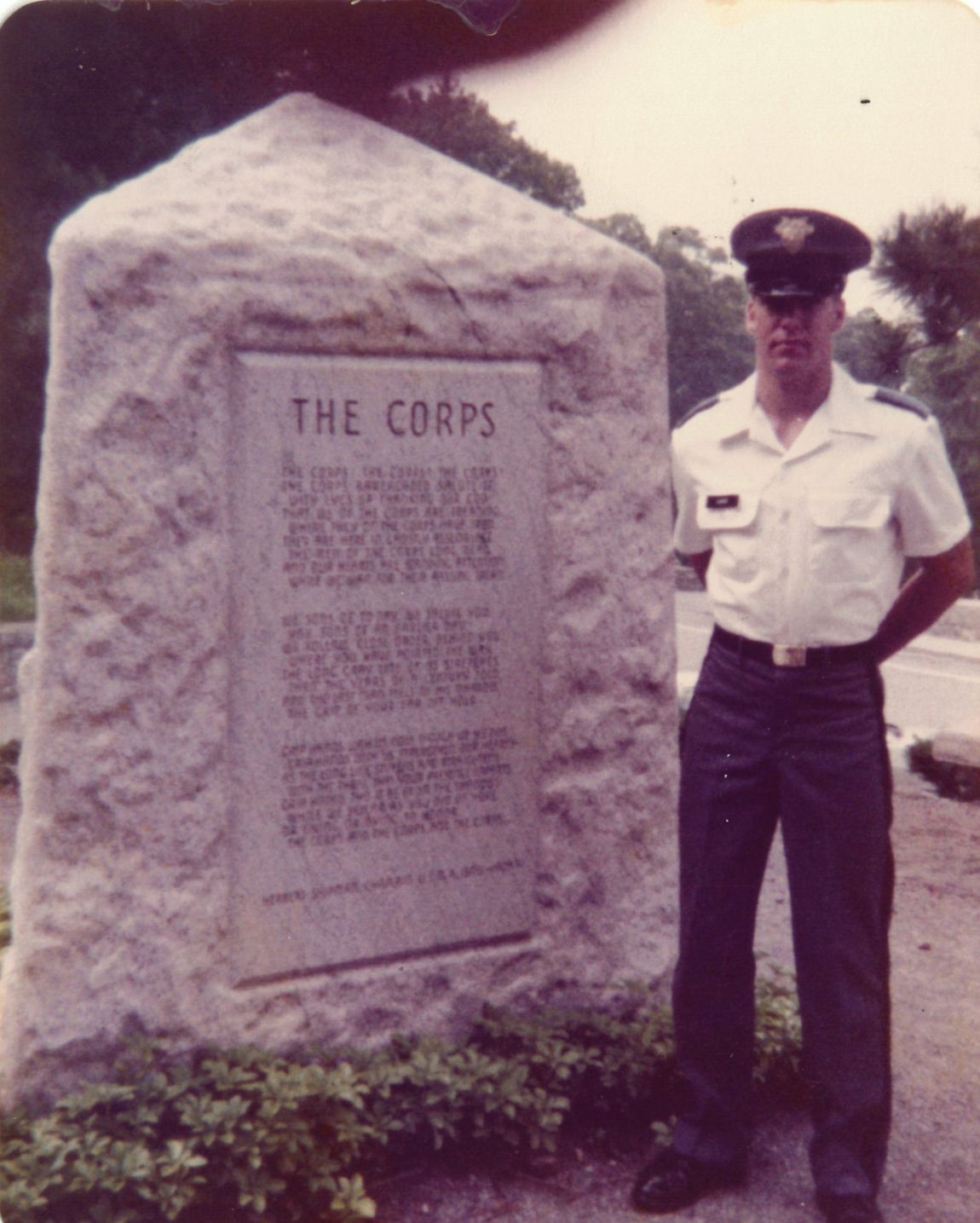
Slide title
Esper as a New Cadet at West Point in 1982
Button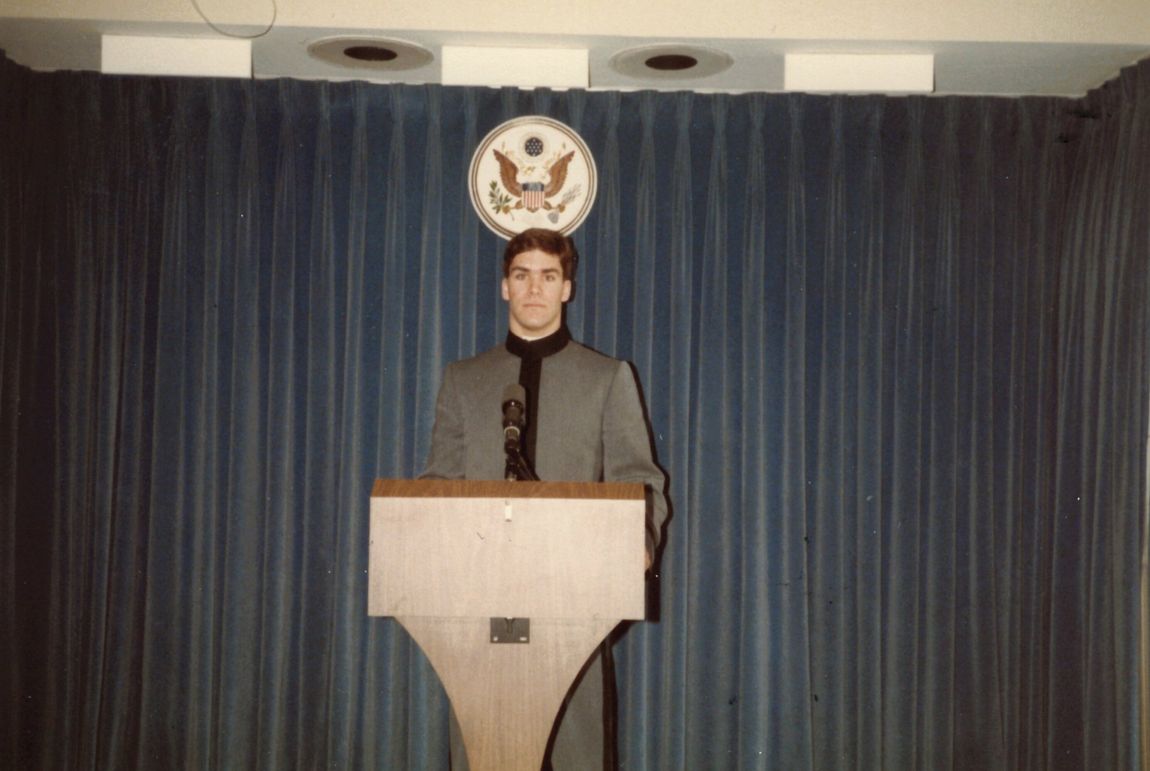
Slide title
Cadet Mark Esper at the podium during a West Point trip to Washington DC in 1983 or 1984
Button
In the summer of 1985, Esper was selected to be one of the Corps’ five top cadet leaders after successfully running Third Class Armor Training at Fort Knox, Kentucky, for rising sophomores. He was named Commander of 1st Regiment, a year-long position responsible for 1100 cadets, soon thereafter.
Mark Esper graduated from West Point in May 1986, having received the Douglas MacArthur Award for Leadership, a Bachelor of Science degree in general engineering, and a commission as a second lieutenant in the Infantry.
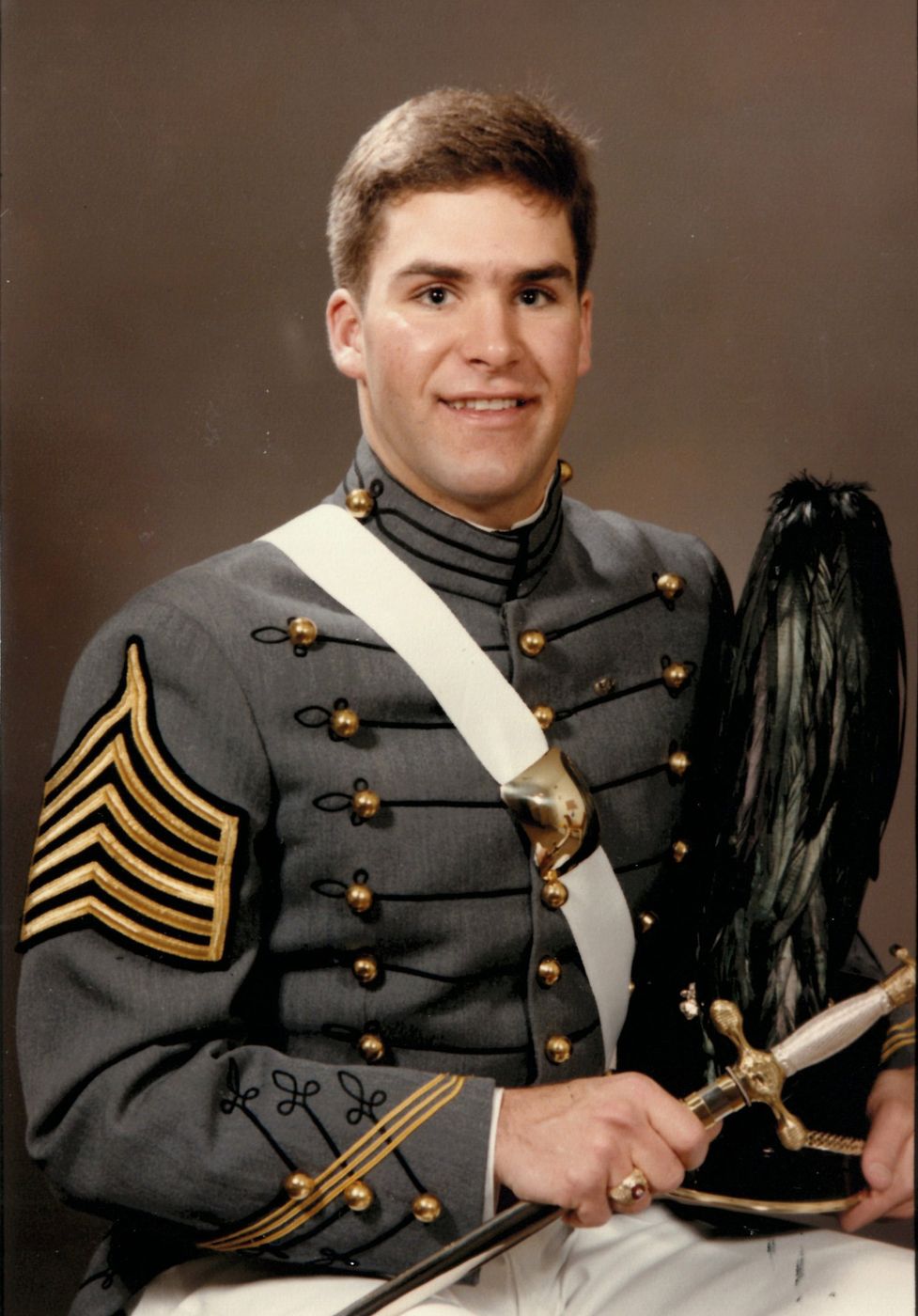
Slide title
Esper's 1986 West Point graduation photo
Button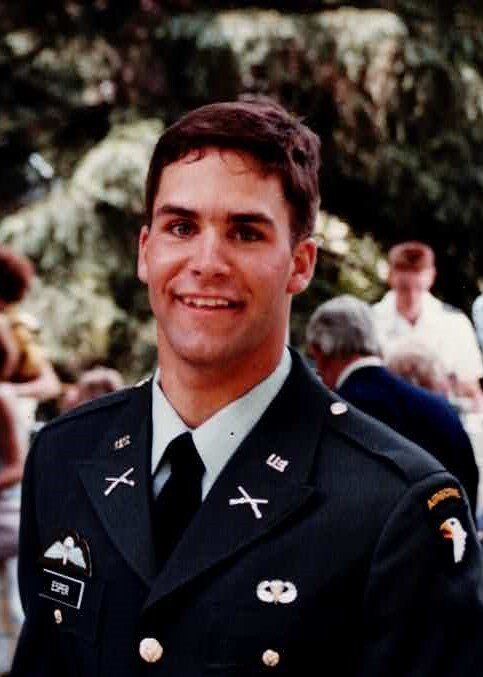
Slide title
Esper newly commissioned on his West Point Graduation Day, May 28, 1986
Button
Army Career
Lieutenant Esper’s first duty station was Fort Benning, Georgia, where he attended the Infantry Officer Basic Course beginning in the summer of 1986, served as the student leader for his class, and graduated with distinction later that fall. After IOBC, he attended the “winter” Ranger School class and graduated from the grueling course in January 1987. Following Ranger School, Esper completed Pathfinder training at Fort Benning. His next assignment was as a rifle platoon leader in the 101st Airborne Division (Air Assault).
Fort Campbell
In late spring 1987, Esper reported to his first duty station at Fort Campbell, Kentucky, home of the 101st Airborne Division. Throughout his four years with the “Screaming Eagles,” he was assigned to the 3rd Battalion, 187th Infantry – the “Rakkasans” – where he served as a Rifle Platoon Leader, TOW Platoon Leader, Rifle Company Executive Officer, and Battalion S-3 (Air). During his time with the battalion, he deployed to the National Training Center at Fort Irwin, California; prepared for contingency operations in Latin America; and conducted Jungle Expert training in Panama. Esper also attended Air Assault School at Fort Campbell, where he was named Honor Graduate, and later earned his Expert Infantryman’s Badge. He was also an alternate member of the 101st Airborne Division’s “Best Ranger” team in 1987.
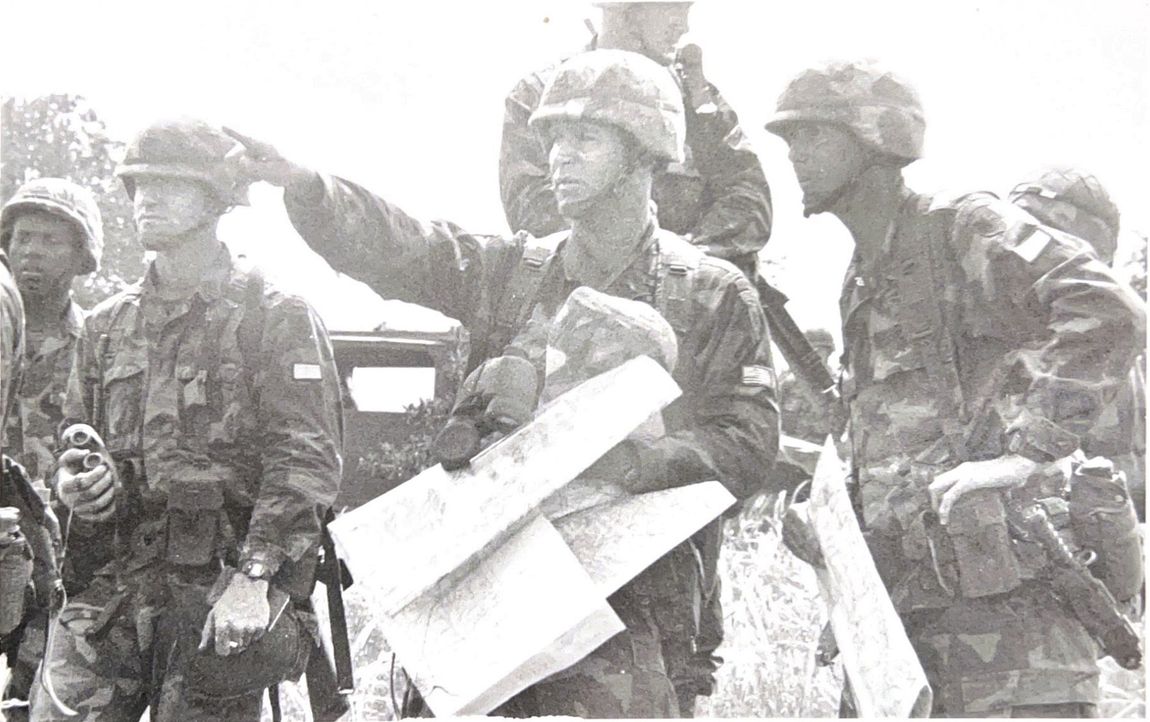
Slide title
Esper giving directions to his squad leaders at Fort Campbell in 1987
Button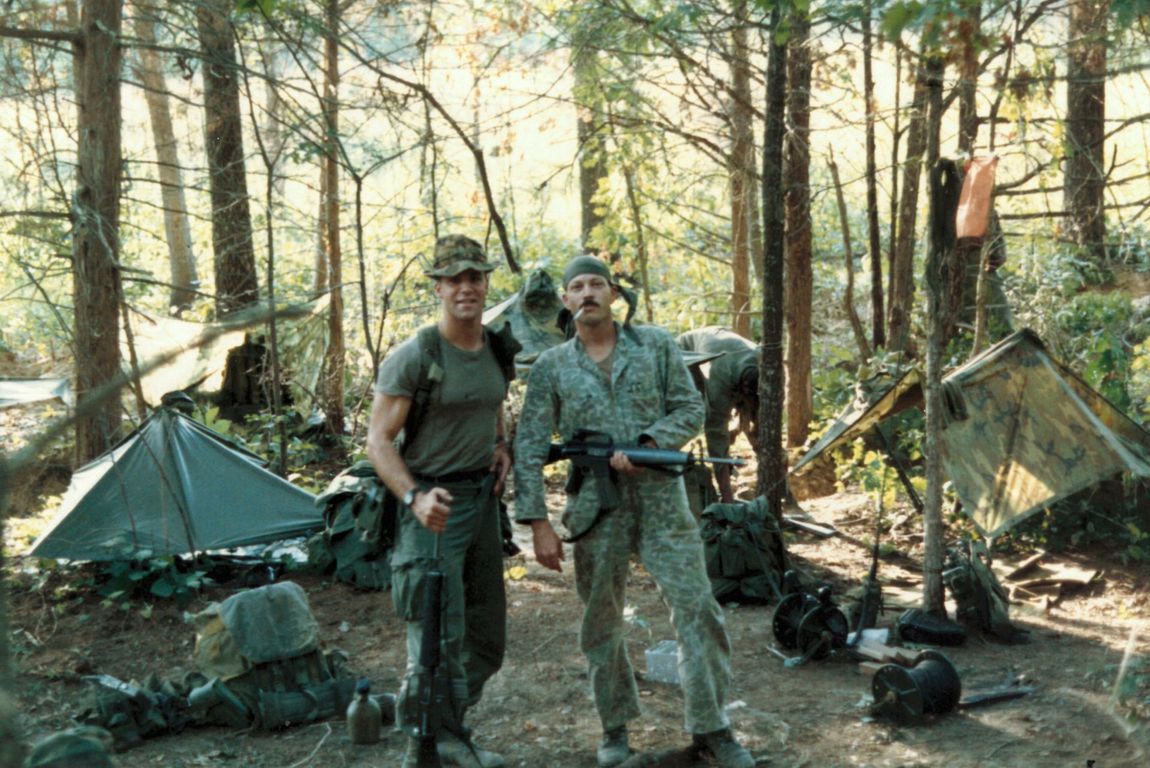
Slide title
Esper with his Rifle Platoon in OPFOR mode at Fort Campbell in 1987
Button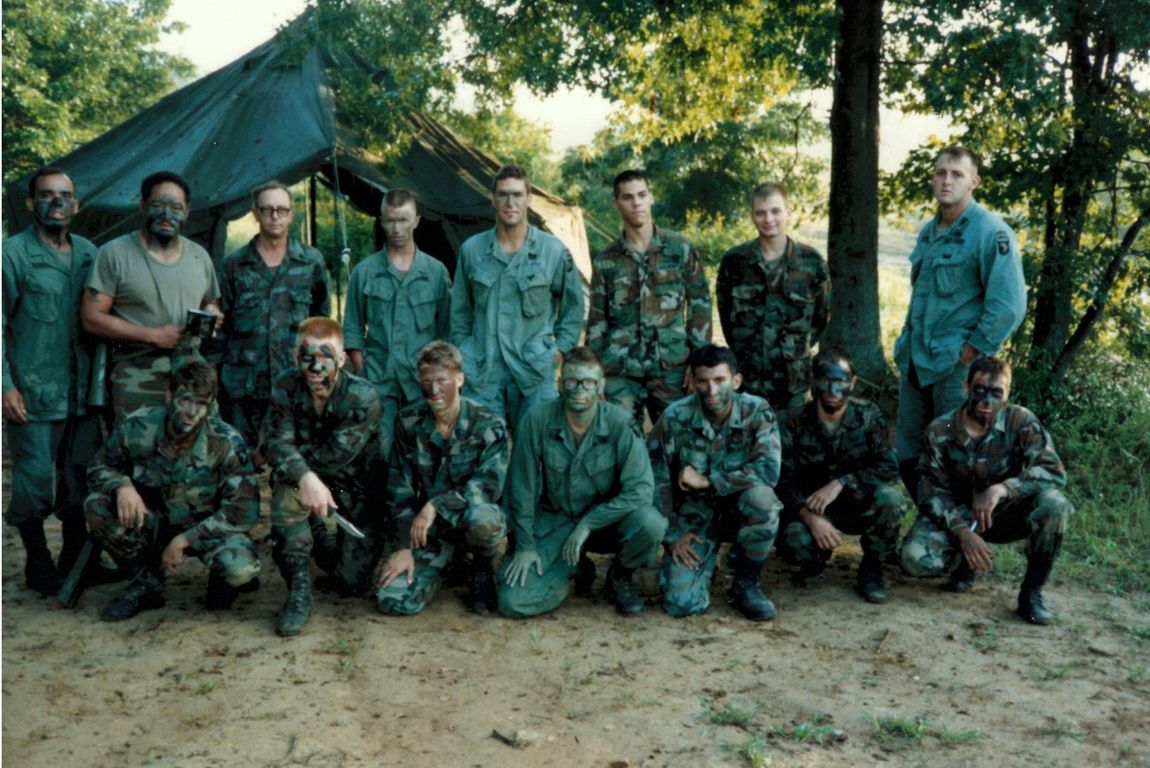
Slide title
Esper during field training with the 3-187 Infantry in the late 1980s
Button
Gulf War
In October 1989, Mark married his wife, Leah, whom he met in the summer of 1988 on a blind date in Nashville. Nine months after their wedding, they were on leave touring the great American West prior to reporting to the Infantry Officer Advanced Course back at Fort Benning, when Iraq invaded Kuwait in early August 1990. Soon thereafter, the 101st Airborne Division was alerted that it would be deploying to the Persian Gulf. Upon learning of this news while traveling in Idaho, Esper called his former unit and asked that his orders be reversed so that he could deploy with the Rakkasans for what became Operation Desert Shield.
Lieutenant Esper rejoined the 3-187 Infantry that August as the Assistant Operations Officer, responsible for running the Tactical Operations Center, helping plan the battalion’s role in the defense of Saudi Arabia, and preparing the unit for desert warfare. Throughout the fall of 1990, the Rakkasans cycled back and forth in the defense for weeks at a time between the covering force area just south of the Iraqi border, and their base of operations located near King Fahd airport just thirty miles northwest of Dhahran, Saudi Arabia. As defensive operations transitioned into offensive planning to force the Iraqis out of Kuwait in what would become Operation Desert Storm, Lieutenant Esper was charged with helping plan what would become one of the largest and longest air assaults in military history.
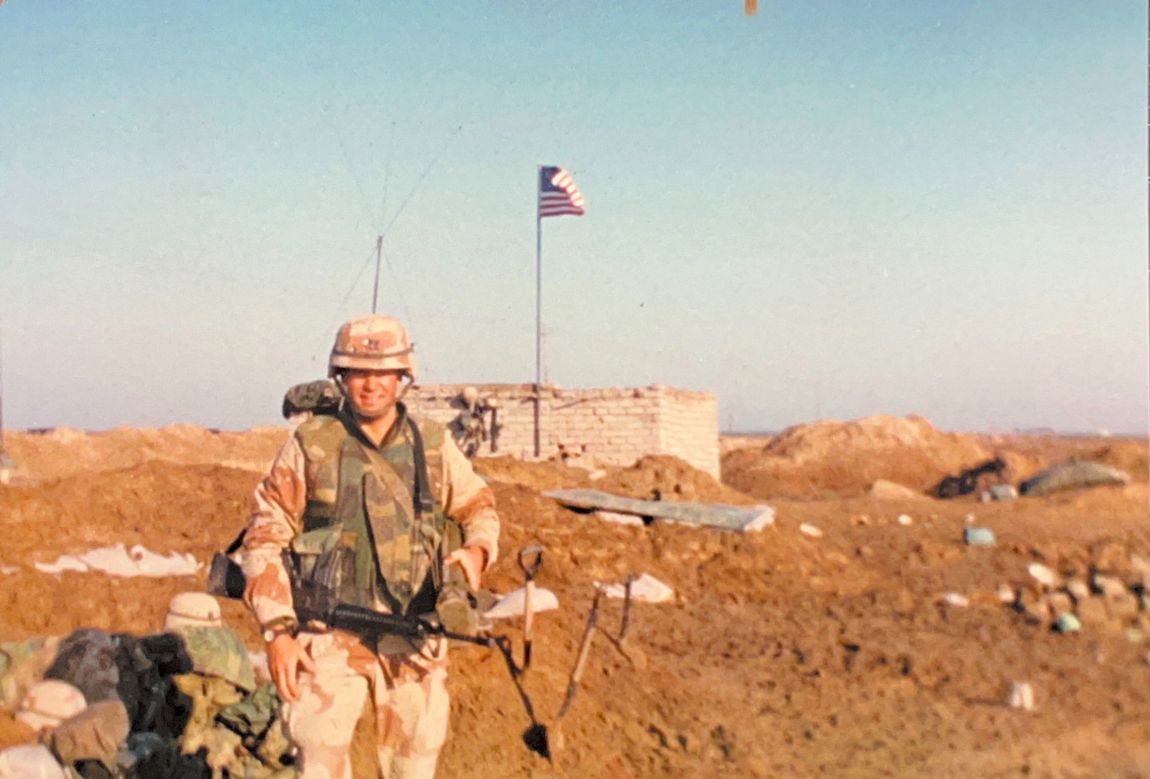
Slide title
Esper outside the 3-187 forward operations center in southern Iraq in Feb 1991
Button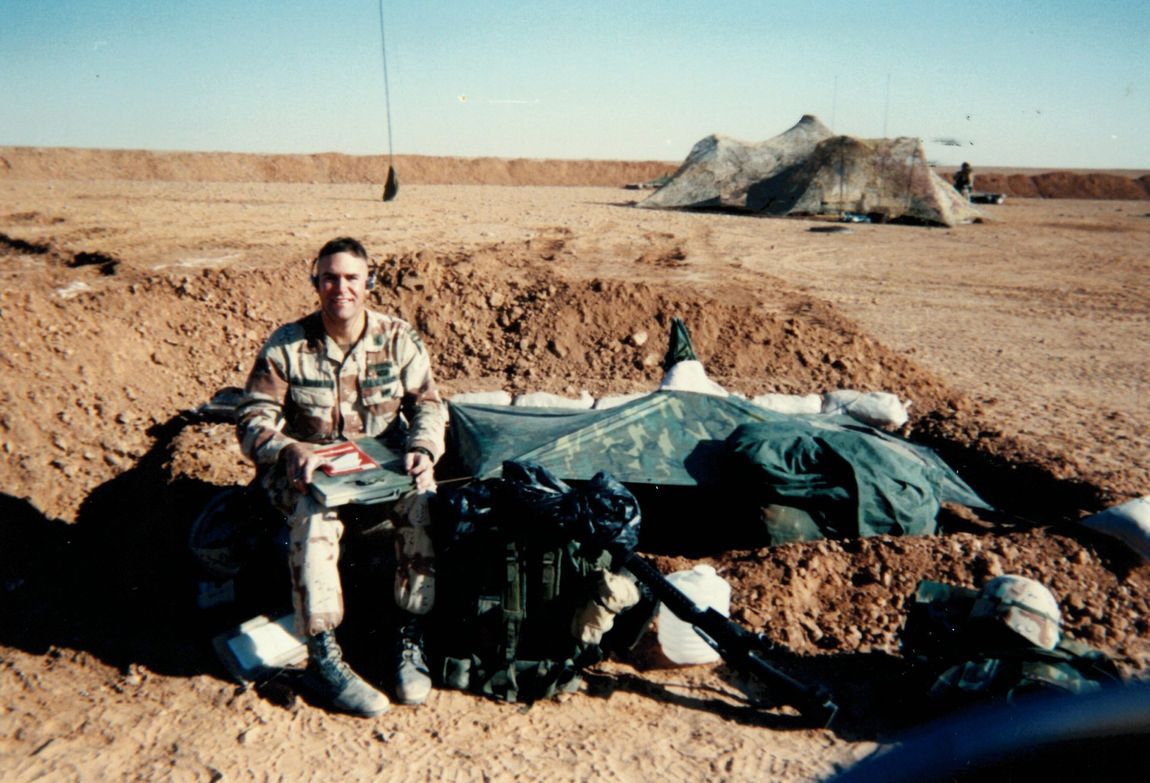
Slide title
Esper near his foxhole with the 101st Airborne Division in Saudi Arabia in 1990
Button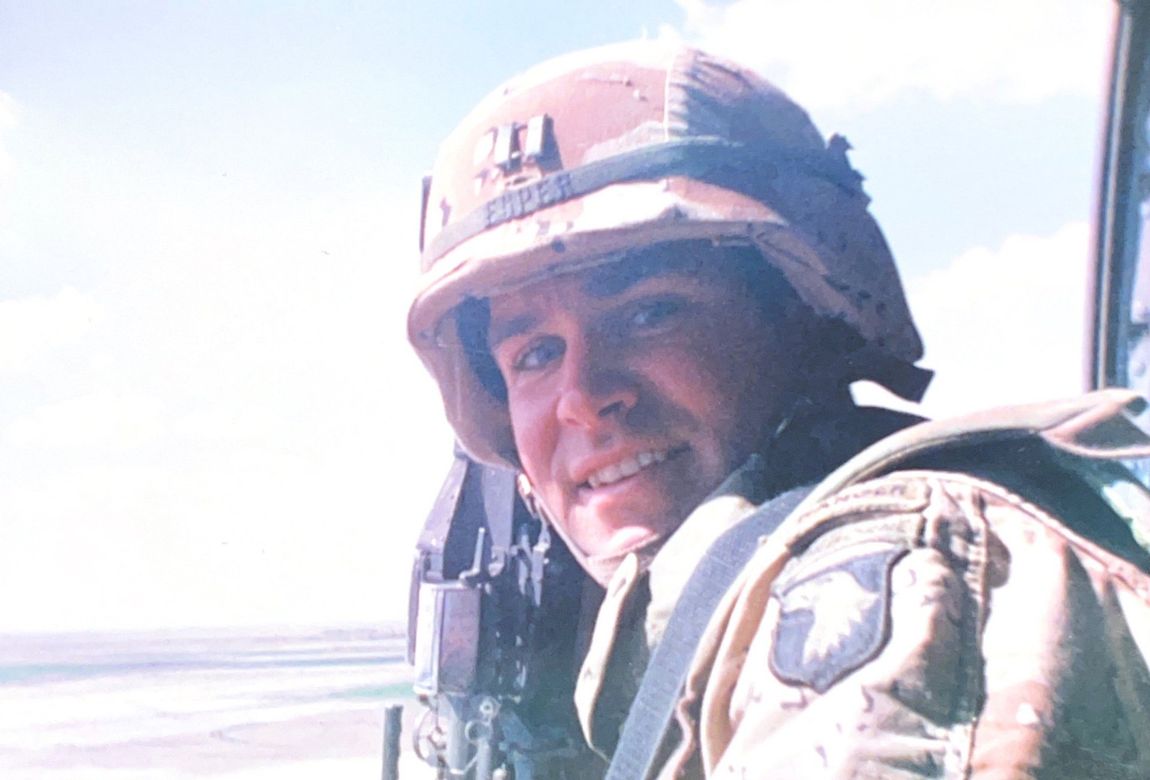
Slide title
Esper flying above the battlefield in southern Iraq near the end of the 1991 Gulf War
Button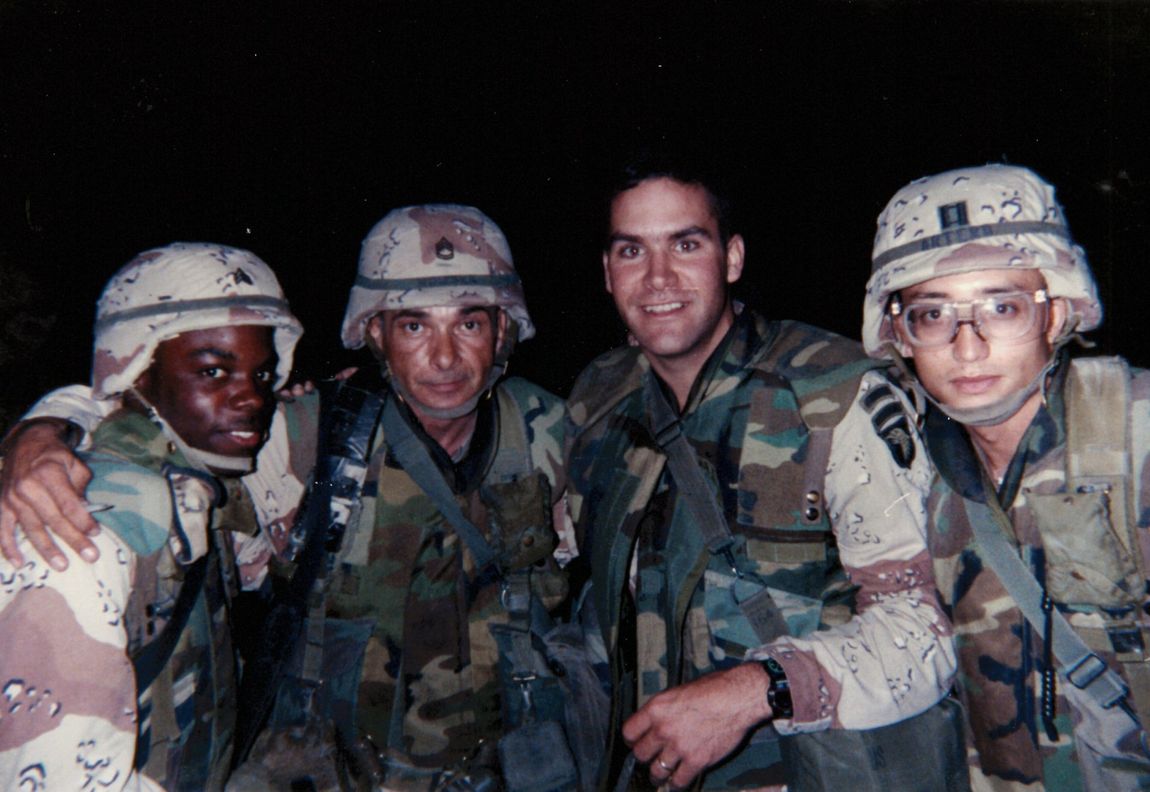
Slide title
Esper and his fellow soldiers of the 3-187 Infantry during the Gulf War in 1991
Button
Operation Shenandoah II was assigned to the division’s 3rd Brigade, the Rakkasan’s higher headquarters. Its purpose was to prevent the reinforcement or retreat of Iraqi forces into or out of Kuwait, respectively. A battalion task force led by the 3-187 Infantry, and appropriately called Task Force Rakkasan, led the main effort to air assault deep into southern Iraq – the so-called “Hail Mary” maneuver of the war – and cut off Highway 8, the primary artery between Iraq and Kuwait. The newly promoted Captain Esper served as the operations officer for the mission. It was launched on February 24, 1991, and ended with the cessation of hostilities on February 28, 1991. It would be a few weeks, however, until the battalion returned to its base in Saudi Arabia. Esper chronicled Operation Shenandoah II in a detailed monograph he wrote while a student at the Infantry Officers Advanced Course (IOAC) in the fall of 1991.
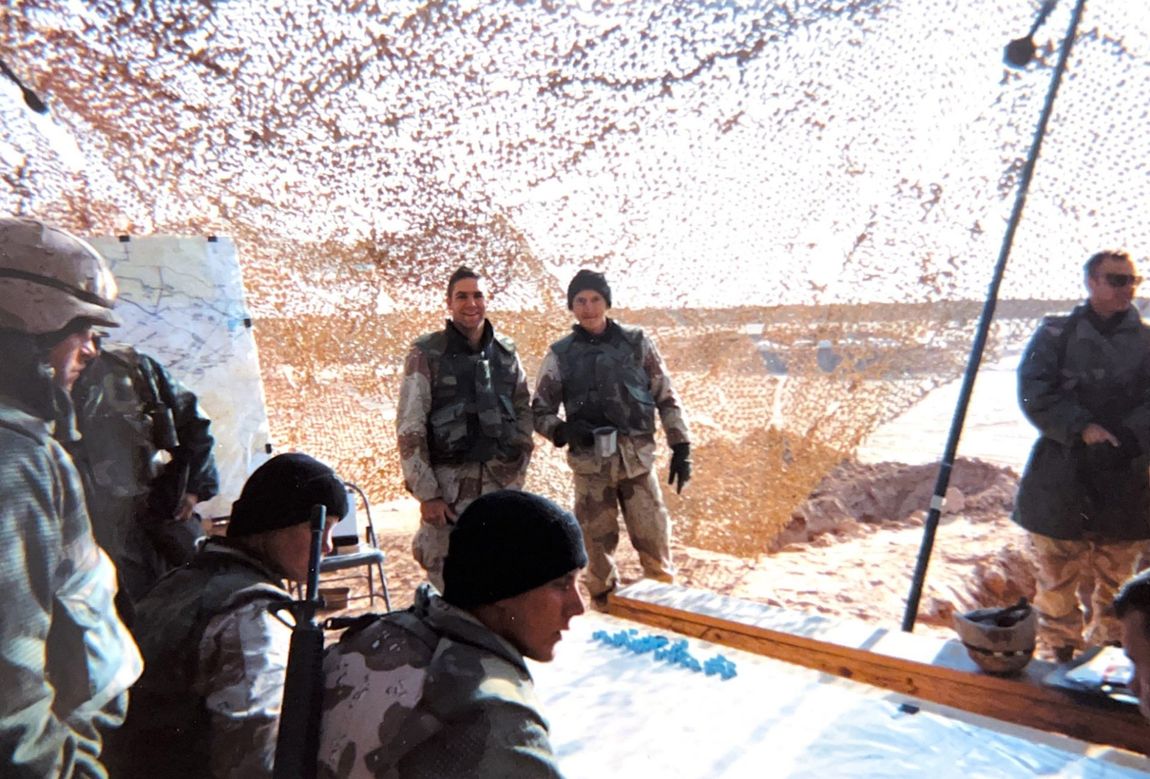
Slide title
Esper and a fellow officer briefing the operations plan for the Task Force Rakkasan air assault into southern Iraq
Button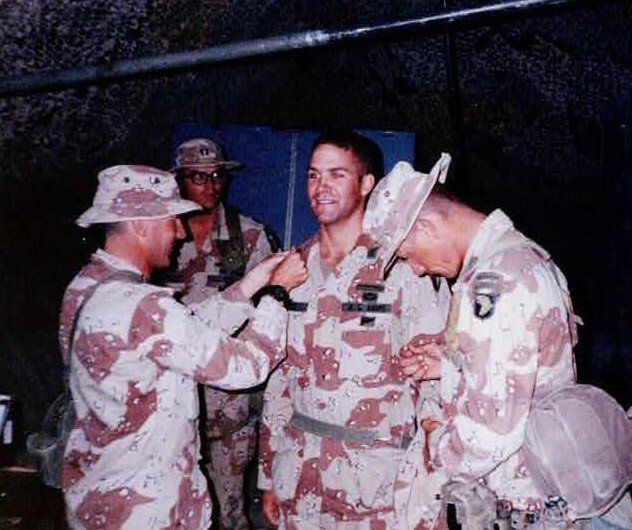
Slide title
Esper being promoted to captain in the desert of northern Saudi Arabia during Operation Desert Shield
Button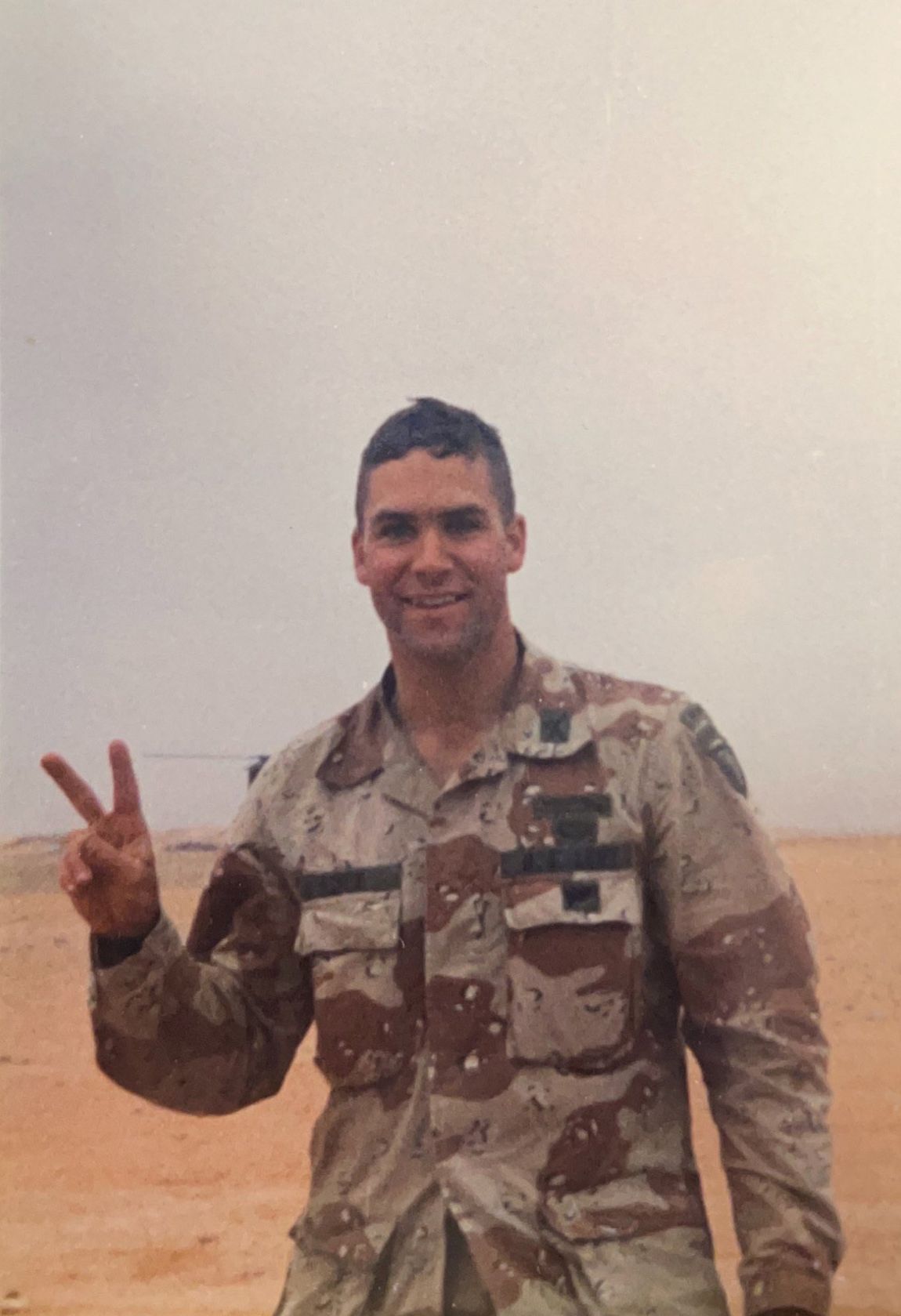
Slide title
Esper flashing the Victory sign at the end of the Gulf War
Button
Fort Benning
The 3-187 Infantry returned to Fort Campbell in April 1991. Captain Esper was awarded the Bronze Star for his actions during the war. He also earned the Combat Infantryman’s Badge, as well as the Kuwait Liberation Medal and the Southwest Asia Service Medal. Esper and his wife did not remain long at Fort Campbell, however. Within a few weeks they were off again to Fort Benning to attend the Advanced Course scheduled for late August 1991. Until then, he would work as an operations officer assigned to the Ranger Training Brigade, with one of his tasks being to update and rewrite the Ranger Handbook.
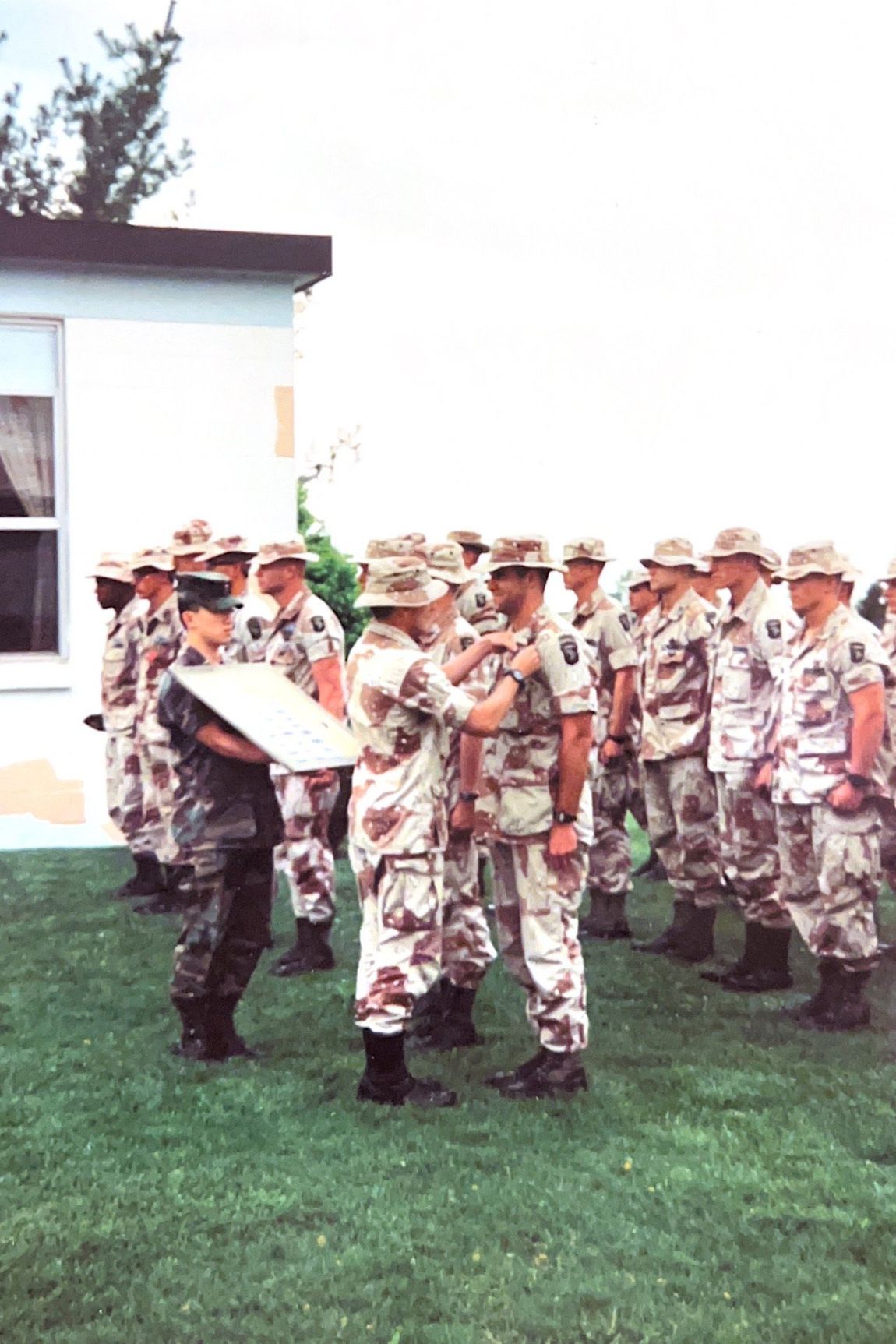
Slide title
Esper being awarded the Combat Infantryman's Badge at Fort Campbell after the Gulf War
Button
Captain Esper attended the Infantry Officers Advanced Course throughout the fall of 1991, serving as a student leader and preparing for company command. During this time, he was notified of his next assignment with the 3-325 Airborne Battalion Combat Team based in Vicenza, Italy. Esper graduated IOAC with distinction, followed immediately by attendance at Jumpmaster School, where he was the Honor Graduate.
Vicenza, Italy
In early 1992, Captain Esper traveled to Italy for his next assignment as deputy operations officer in the 3-325 Airborne Battalion Combat Team, a sister unit of those infantry battalions with similar nomenclatures based at Fort Bragg, North Carolina, with the 82d Airborne Division. The unit was later expanded and redesignated the 173rd Airborne Brigade. Leah Esper, now pregnant with their first child, would follow her husband to Italy months later.
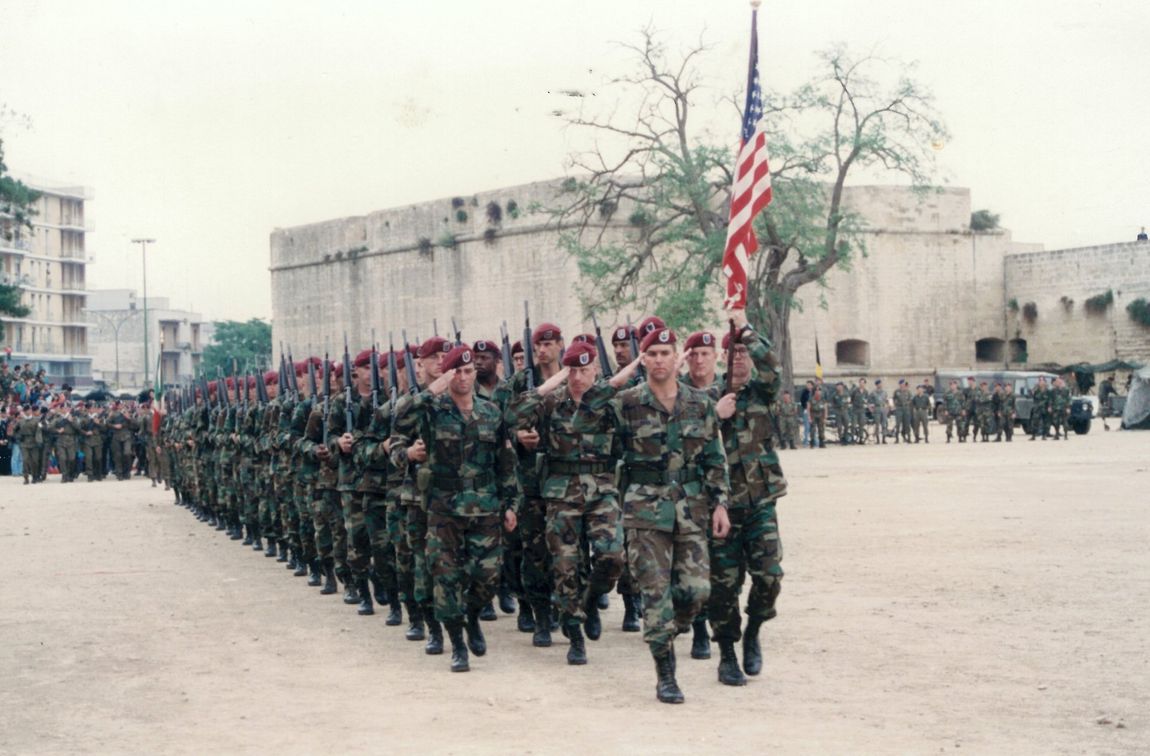
Slide title
Esper leading his paratroopers during a ceremony in Europe
Button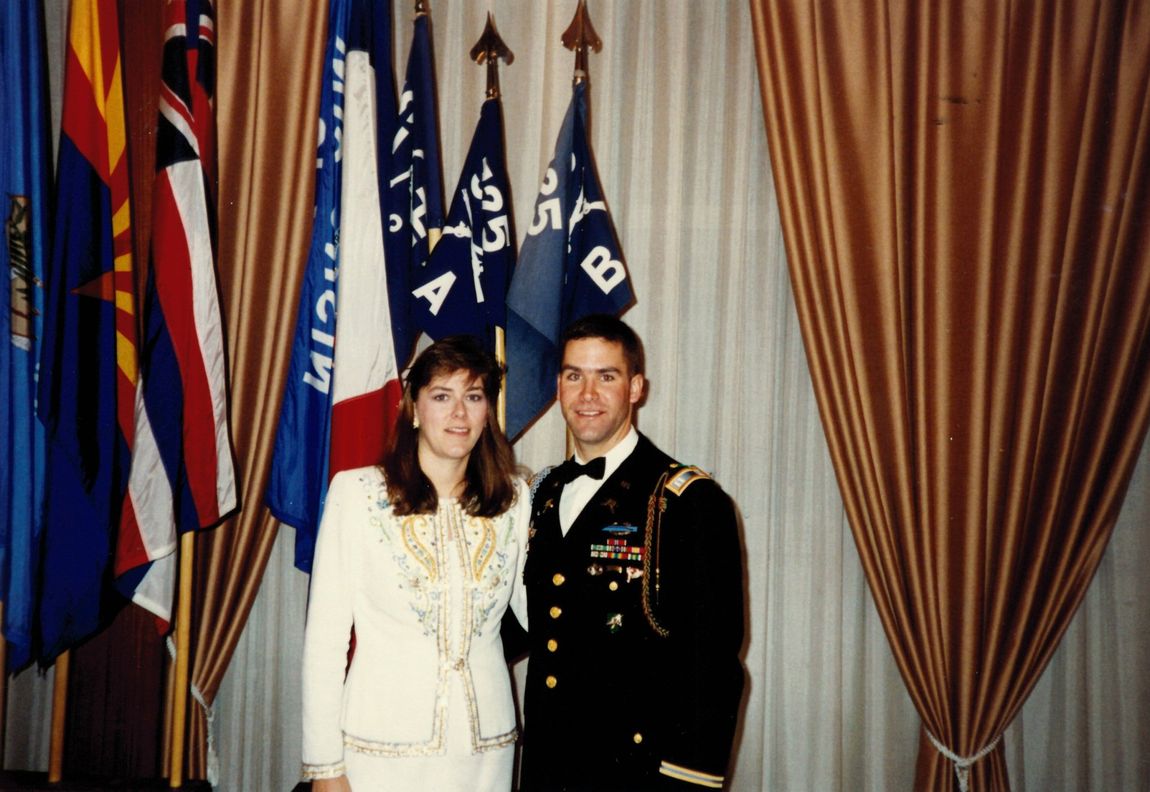
Slide title
Esper with his wife, Leah, at an Army formal in Italy in the early 1990s
Button
Esper served in Italy with the “Blue Falcons” for nearly three years, with the last half of his assignment as the commander of an airborne rifle company responsible for worldwide contingency operations. During command, Esper led Bravo Company on multiple deployments to Germany and other locations throughout Europe. His company also successfully completed a grueling winter evaluation at the Combat Maneuver Training Center in Hohenfels, Germany in late 1993. This was followed by a first of its kind airborne deployment back to the U.S. to conduct training at the Joint Readiness Training Center at Fort Polk, Louisiana, for another successful external evaluation for Bravo Company. He later prepared his company for military operations in Bosnia and Herzegovina.
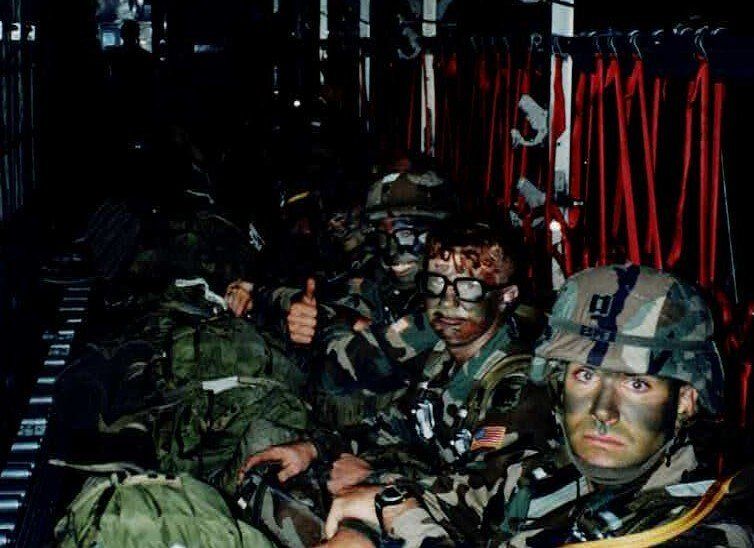
Slide title
Esper on an airborne jump over Germany in 1993
Button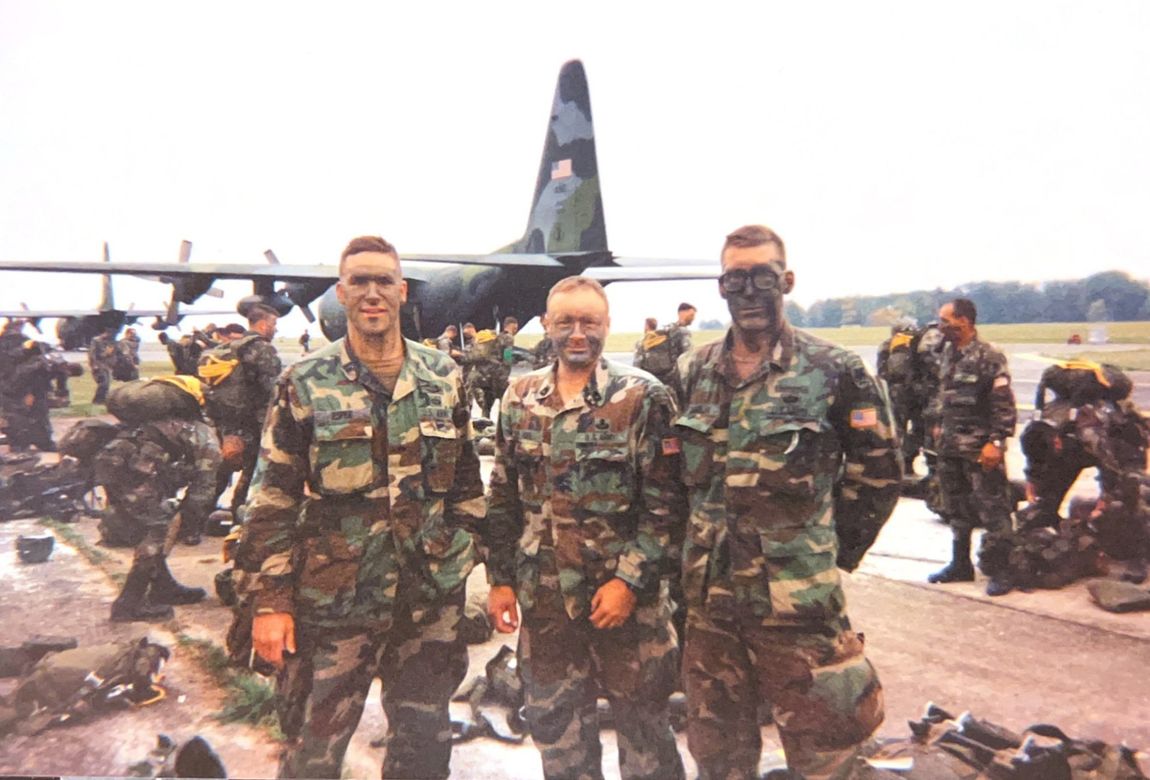
Slide title
Esper and fellow soldiers of Bravo Company preparing for an airborne jump into England
Button
Of greater importance during this time, however, was the birth of the Esper’s first son, Luke, at an Army field hospital in Italy in September 1992. In the summer of 1994, Captain Esper relinquished command of Bravo Company, 3-325 ABCT, and returned to the United States with Leah and Luke.
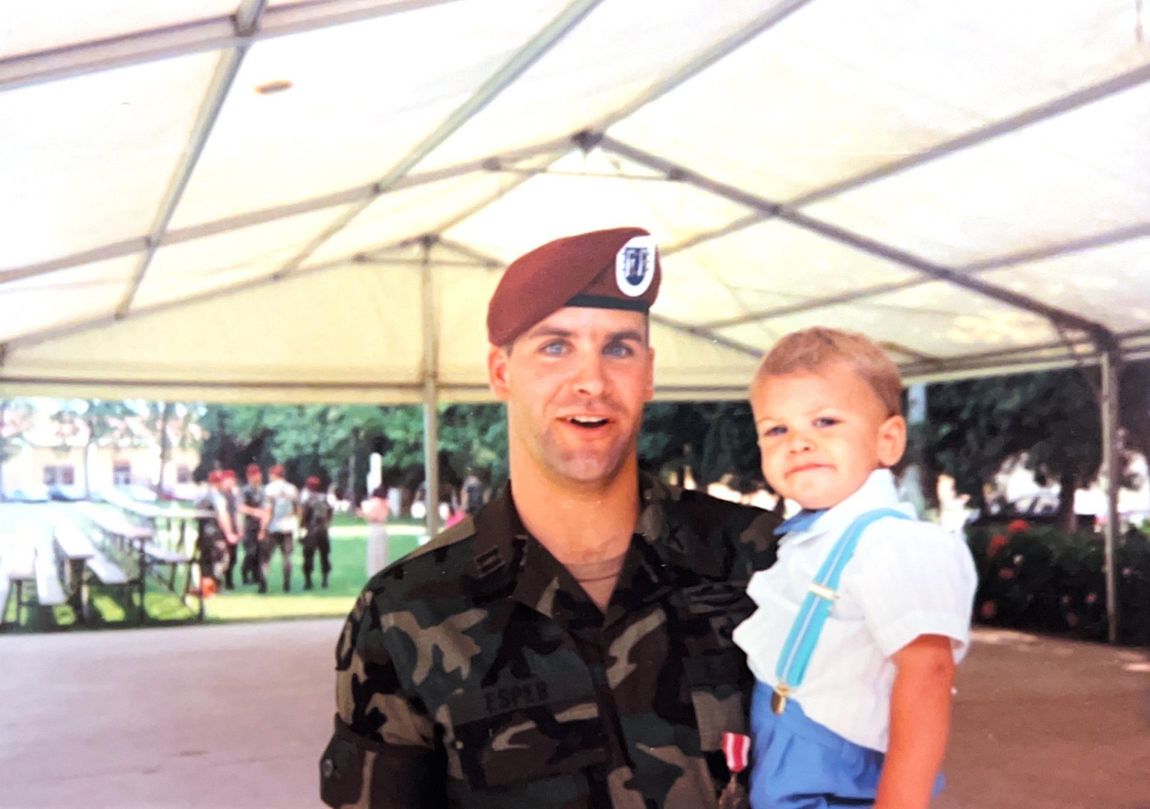
Slide title
Esper at his change of command ceremony with his son, Luke, in 1994
Button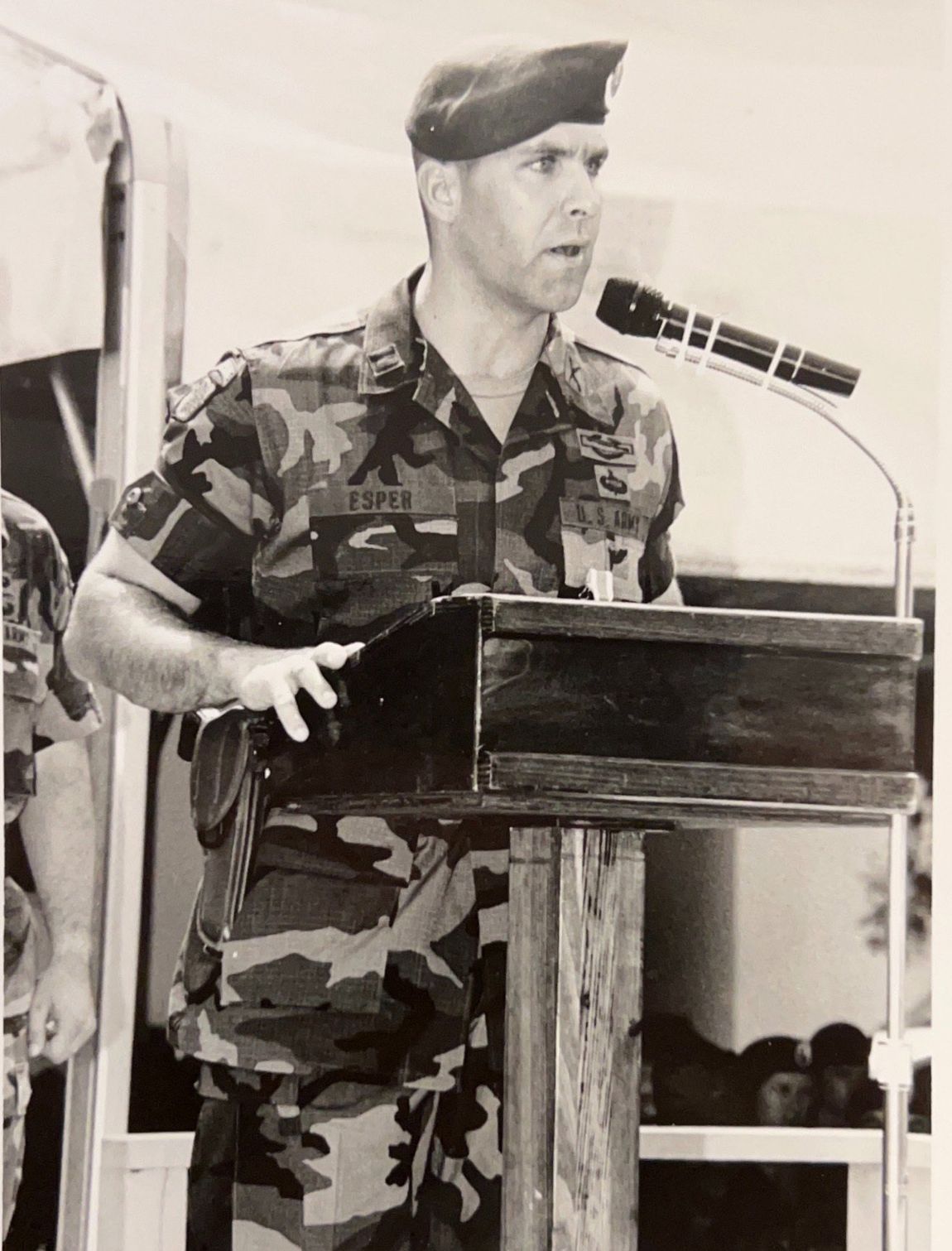
Slide title
Esper speaking to his paratroopers in Italy in 1994
Button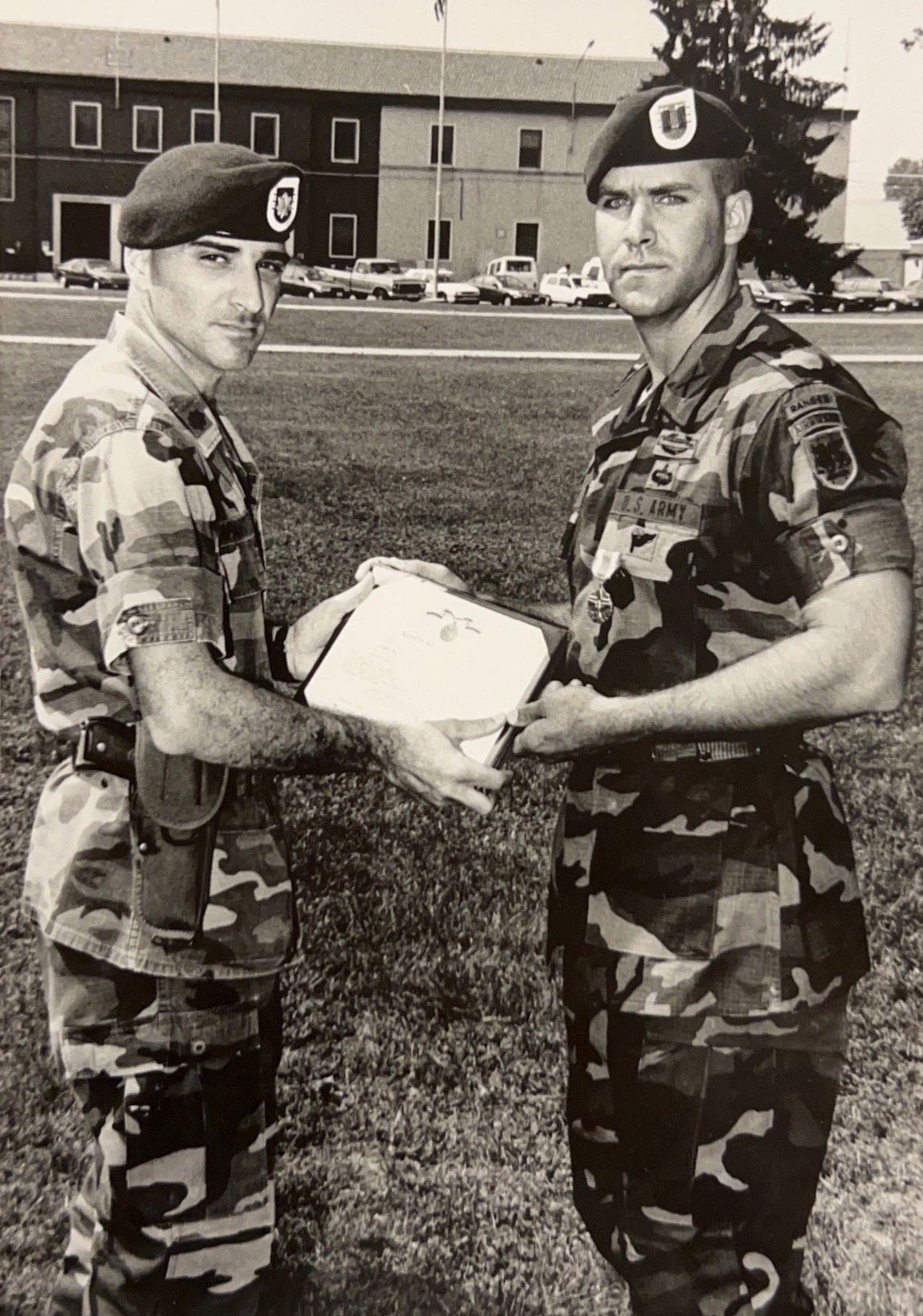
Slide title
Esper being presented an award for his successful command of an airborne infantry company in Italy in 1994
Button
The Pentagon
In early 1994, Captain Esper was notified that he was one of two officers selected to become an Army Fellow, which meant attendance at the JFK School of Government at Harvard University to complete a masters in public administration, followed by an assignment at the Pentagon as an Army Strategist. In doing so, Esper turned down an opportunity to return to West Point and teach in the Social Sciences department.
Following graduation from Harvard in 1995, Esper was assigned to the War Plans Division in the Office of the Deputy Chief of Staff for Operations, and given the U.S. Pacific Command portfolio, which included the entire Indo-Pacific area of responsibility. In this capacity, he helped formulate Army positions on issues such as China-Taiwan-US relations, long-term strategic planning for US forces in the Asia-Pacific, and the National Military Strategy. In October 1995, Leah gave birth to their second son, John, at the Fort Belvoir hospital in Virginia.
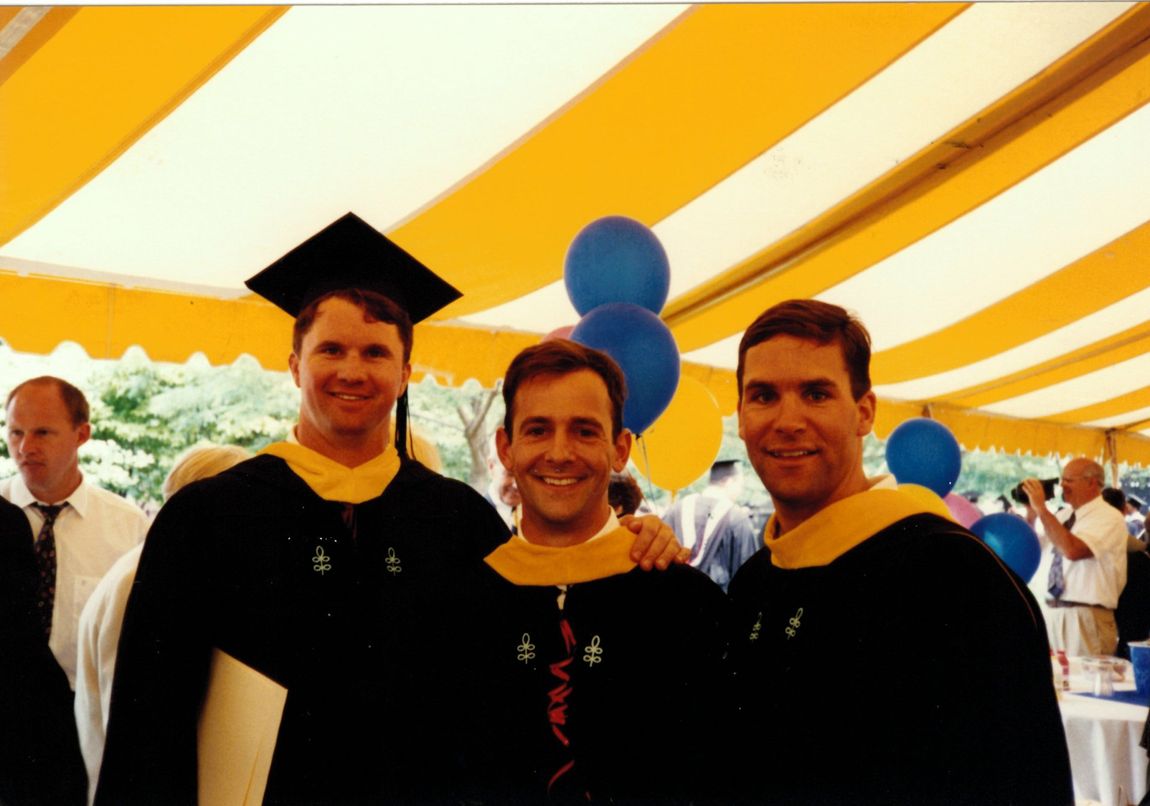
Slide title
Esper at his graduation from Harvard in 1995
Button
In the mid-1990s, the U.S. Army was implementing a massive drawdown in the wake of the Cold War’s end. In the shadow of this process, coupled with the demands of a growing family and a likely return to the grind of continuous training and deployments, Captain Esper – who was recently selected for promotion to Major – decided to resign his commission and leave the service in late fall 1996 after 10+ years on active duty.
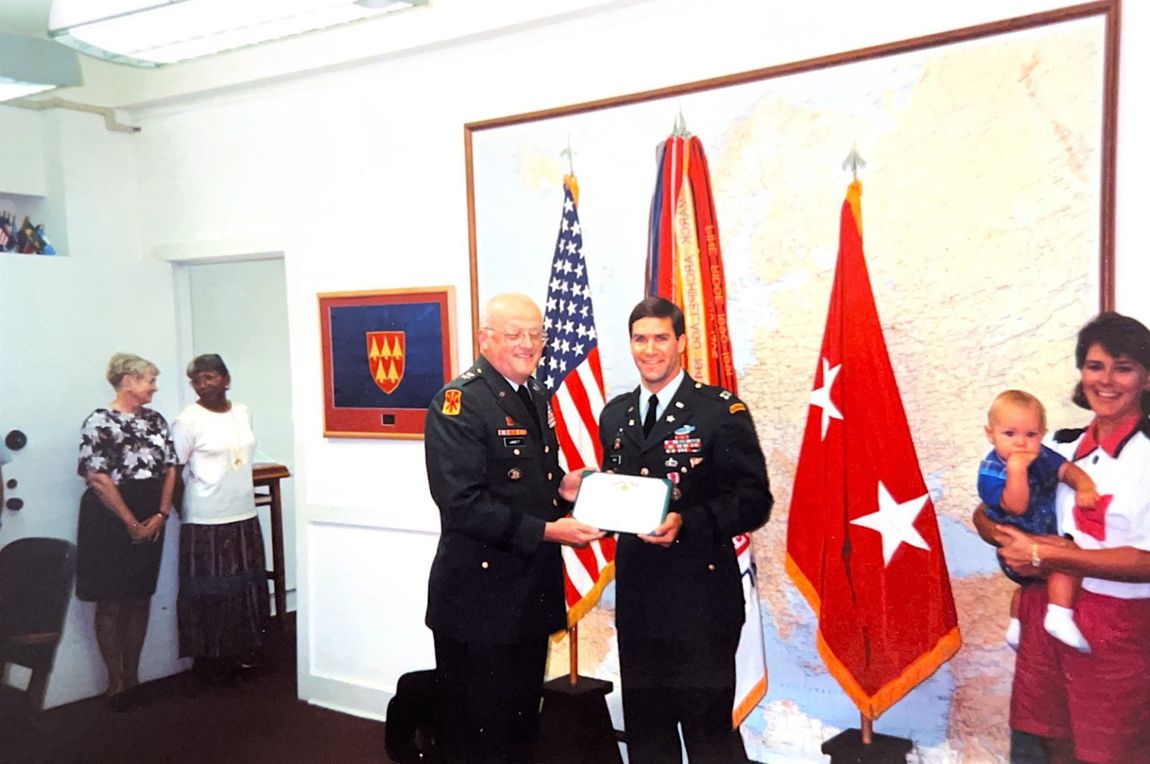
Slide title
Esper at a Pentagon award ceremony in his honor upon leaving active duty in 1996
Button
By the end of 1996, Esper was now Chief of Staff at The Heritage Foundation, a prominent Washington, D.C. think tank that made its mark helping President Ronald Reagan develop and implement a new conservative agenda for America in the 1980s. Esper also joined the Virginia National Guard, where he served as an operations officer in the headquarters of the 29th Infantry Division at Fort Belvoir, Virginia. During his time at Heritage, Esper also began pursuing his Ph.D. in Public Policy at George Washington University in downtown D.C., often attending classes two nights a week.
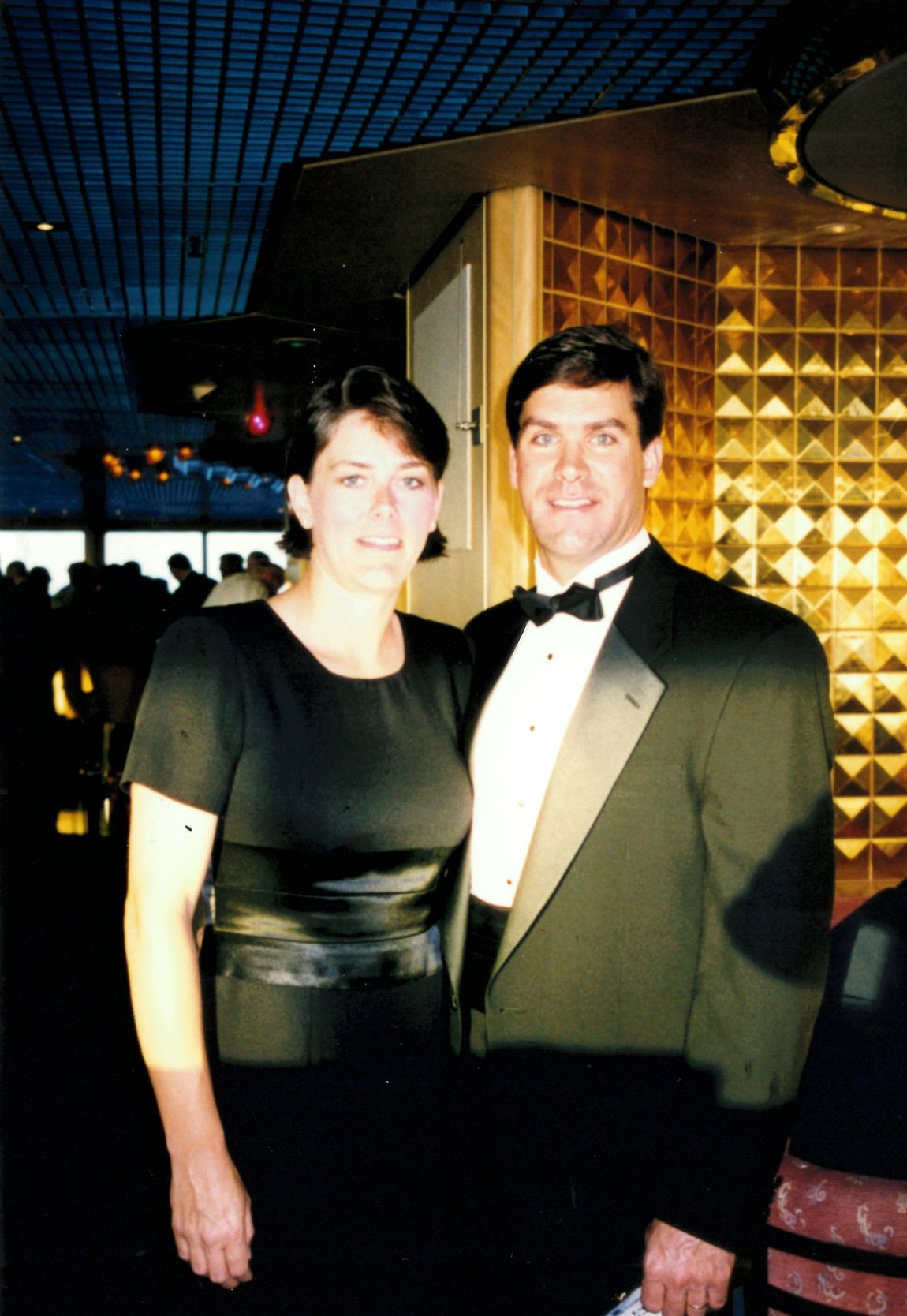
Slide title
Esper and his wife, Leah, at a Heritage Foundation event in 1997
Button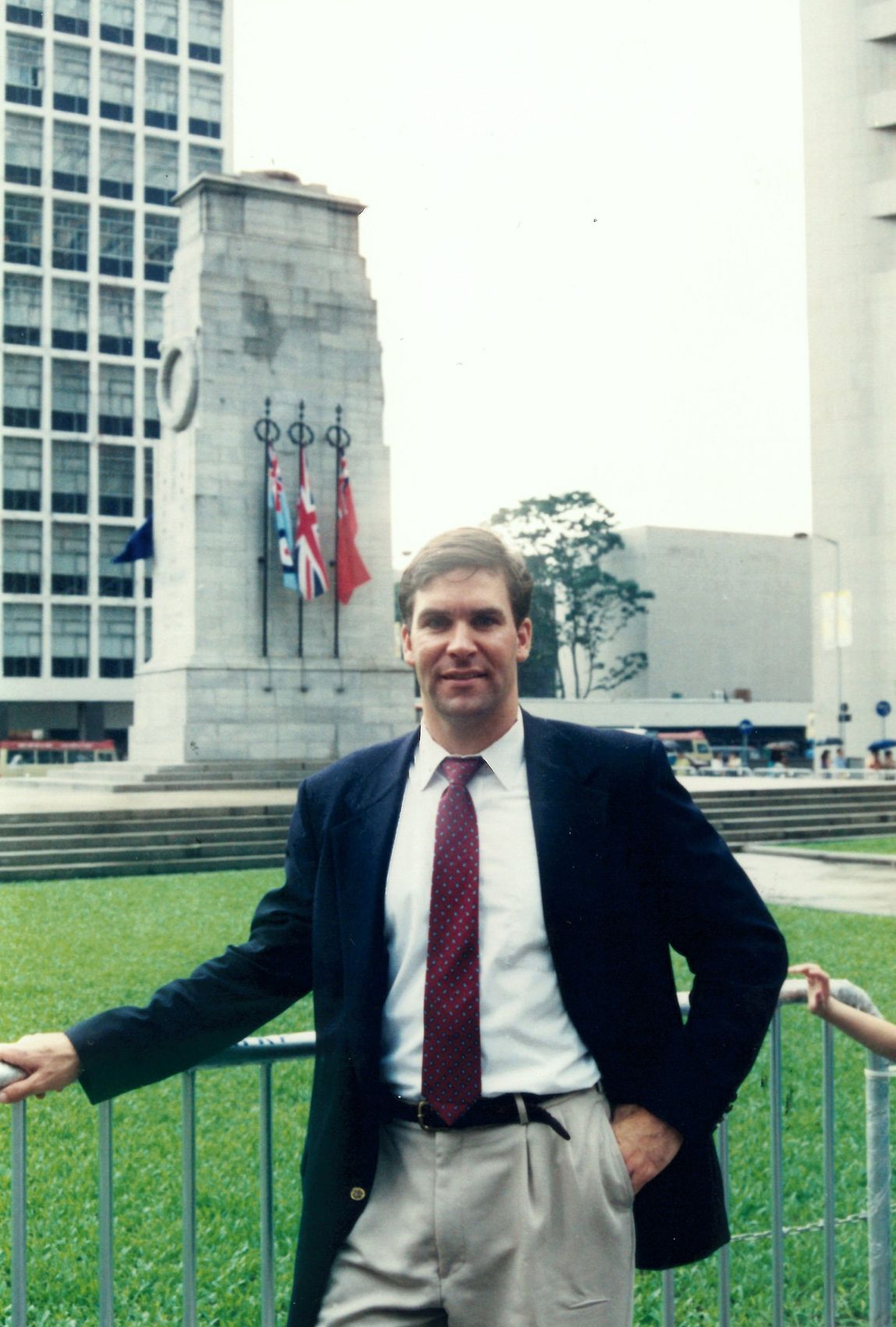
Slide title
Esper in Hong Kong in 1997 with The Heritage Foundation for the handover to China
Button
Capitol Hill
In 1999, Mark and Leah welcomed their third child, Kathryn, into the world. Esper was now the Legislative Director and National Security Advisor to Senator Chuck Hagel (R-NE). By the end of the year, Esper moved up to become a senior professional staff member for national security on the Senate Governmental Affairs Committee, while also responsible for the same portfolio of military, intelligence, and foreign policy issues (with an emphasis on China) for the committee’s chairman – Senator Fred Thompson (R-TN) – in his personal office.

Slide title
Esper and Family with Sen Fred Thompson on Capitol Hill in 2000
Button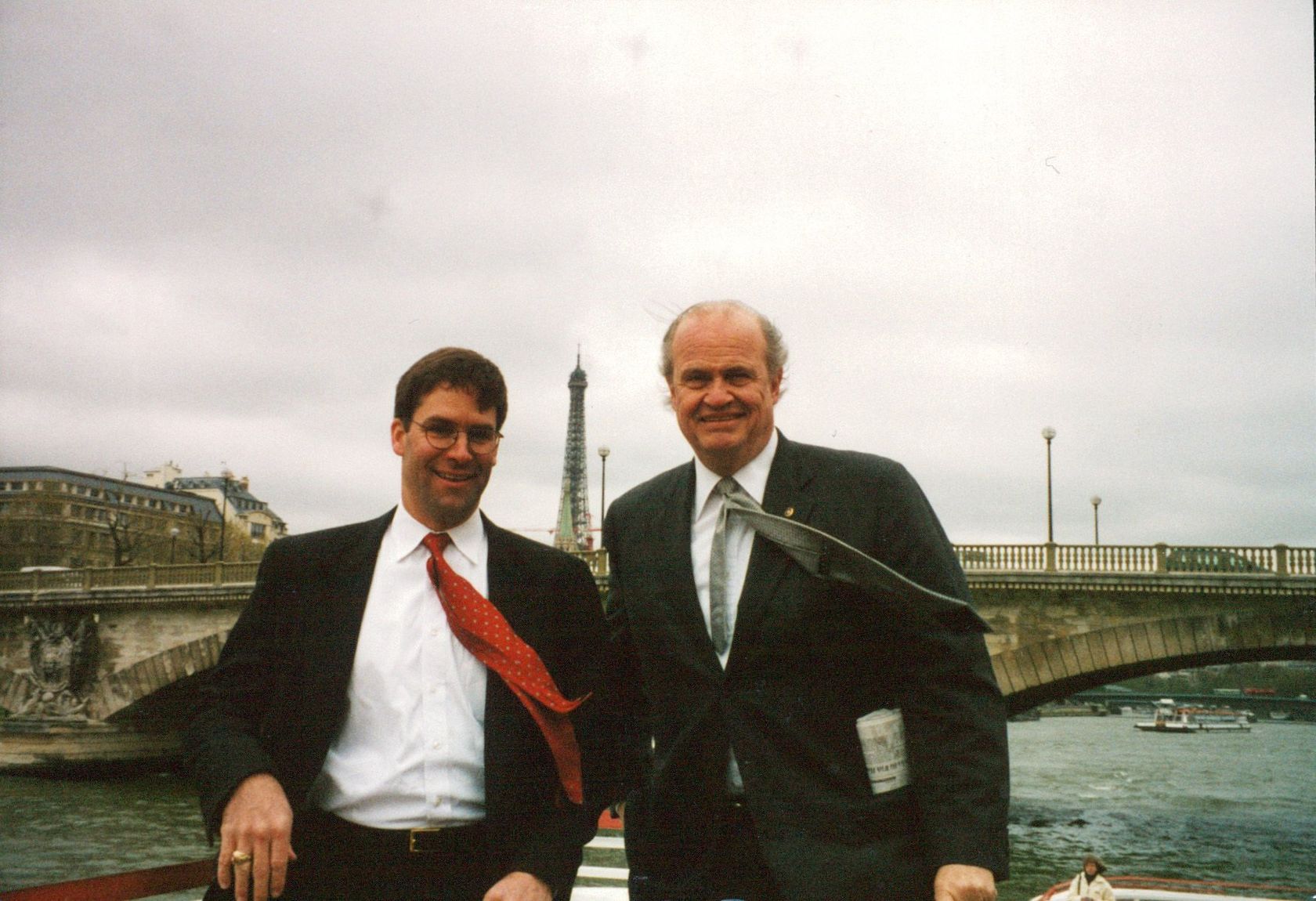
Slide title
Esper with Sen Fred Thompson on a Senate Trip to Paris in early 2000s
Button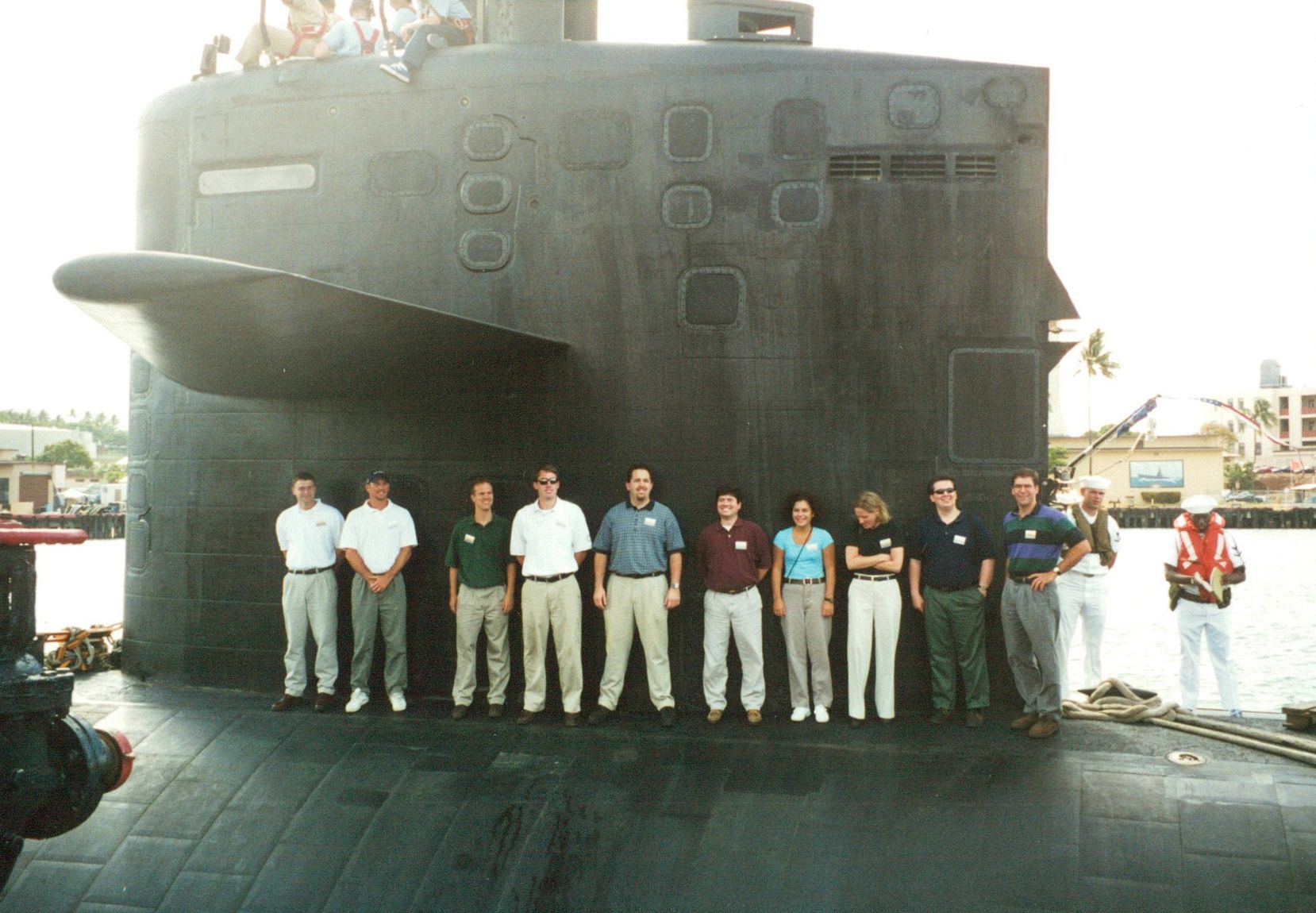
Slide title
Esper on a Congressional Trip aboard a U.S. submarine in early 2000s
Button
After two years with Thompson, and following the senator’s announced retirement, Esper became the senior professional staff member for the Senate Foreign Relations Committee, which was then led by Senator Jesse Helms (R-NC) and Joe Biden (D-DE). Esper was responsible for the same portfolio of national security issues he had been long working on Capitol Hill, with the added responsibility now of managing defense trade and arms sales issues that passed through the committee, authorizations for the use of force abroad, overseeing several State Department bureaus, serving as the staff interlocutor with the Pentagon and the Intelligence Community, and helping produce the annual State Department Authorization and Security Assistance bills.

Slide title
Esper and his wife, Leah, with President George W. Bush at a White House event
Button
By this time, Major Esper had also transferred from the Virginia National Guard to the D.C. National Guard, where he was assigned to the Mobilization Augmentation Detachment that worked out of the National Guard Bureau headquarters in Arlington, Virginia. One of Esper’s special duties at the time found him working at the Pentagon in the Office of the Secretary Defense for Special Operations/Low-Intensity Conflict prior to and following the tragic terrorist attacks of 9/11.
With the committee chairman’s planned retirement, Esper moved to the House of Representatives to become the Policy Director for the House Armed Services Committee. In this role, he led the policy staff on all foreign policy and defense issues, organized hearings and inquiries related to these matters, and prepared legislation (including the relevant titles of the annual defense authorization bill), reports, and policy positions on these items. Esper also served as the staff director for the HASC’s Special Oversight Panel on Terrorism.
Within a year, however, the Pentagon under President George W. Bush asked Esper to become the Deputy Assistant Secretary of Defense for Negotiations Policy, leading a four-bureau directorate responsible for all of DoD’s arms control, non-proliferation, and international agreements policies. In this capacity, he worked closely with the White House, the National Security Council, the State Department, and other stakeholders to formulate and advance U.S. policy, successfully leading multi-agency delegations abroad to achieve set goals.
DASD Esper remained at the Pentagon for two years, which were challenging times for the Defense Department DoD given the war against Iraq that was launched in March 2003, coupled with the ongoing conflict in Afghanistan. During this time, Esper and his team helped develop, implement, and multilateralize the Proliferation Security Initiative, alongside the State Department, as a new international mechanism to deal with the spread of weapons of mass destruction (including their core technologies and delivery systems) by intercepting these items during transport and seizing them. For his service and achievements, Esper was awarded the Department of Defense Medal for Distinguished Public Service by Secretary of Defense Donald Rumsfeld in 2004.
Esper returned to Capitol Hill in mid-2004 to become National Security Advisor for Senator Bill Frist (R-TN), the Senate Majority Leader. This position gave him responsibility once again responsible for the fully panoply of military, foreign policy, intelligence, and other national security matters. With this role, however, came the added duty of responsibility for managing these issues at both a policy and political level – within the Senate; at senior levels in the White House, Pentagon, State Department, and the Intelligence Community; with the House of Representatives; and with foreign governments and international leaders. It also meant staying abreast of the various committees overseeing their executive branch departments and agencies, the legislation they were advancing, and their annual authorization and appropriations bills.
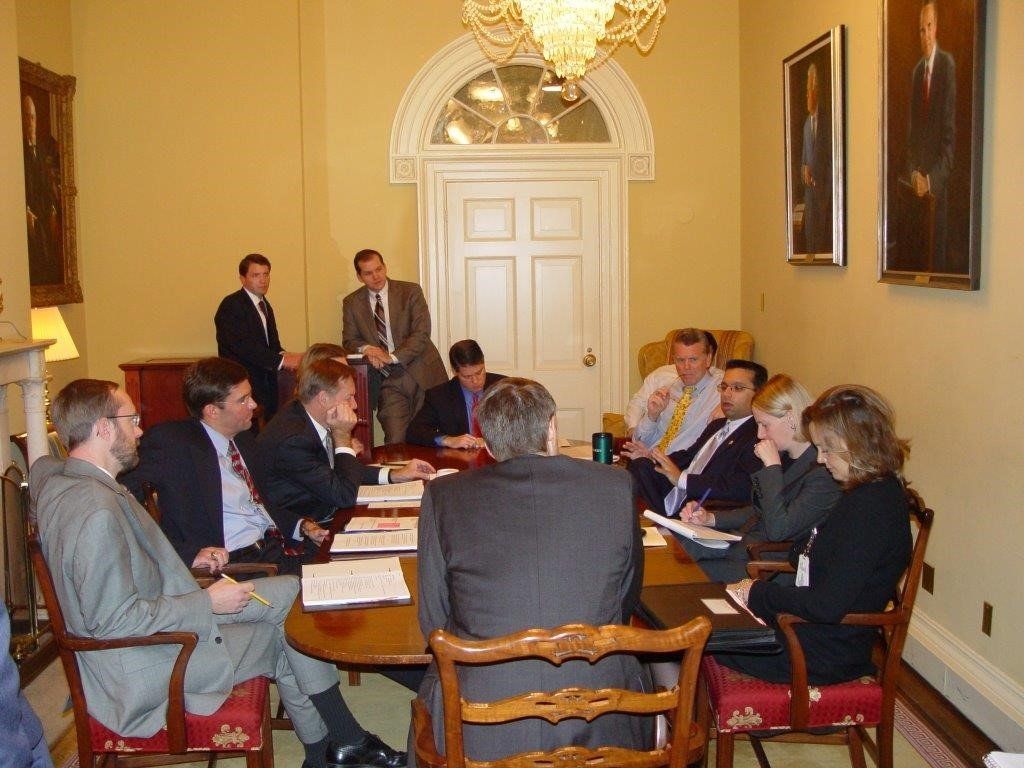
Slide title
Esper and the senior staff for Senate Majority Leader Frist
ButtonSlide title
Esper discussing aid for Africa with Bono in 2005 or 2006
Button
Moreover, with Frist considering a possible future run for the presidency, he and Esper spent considerable time traveling abroad to meet heads of state and parliamentarians in key countries around the globe.
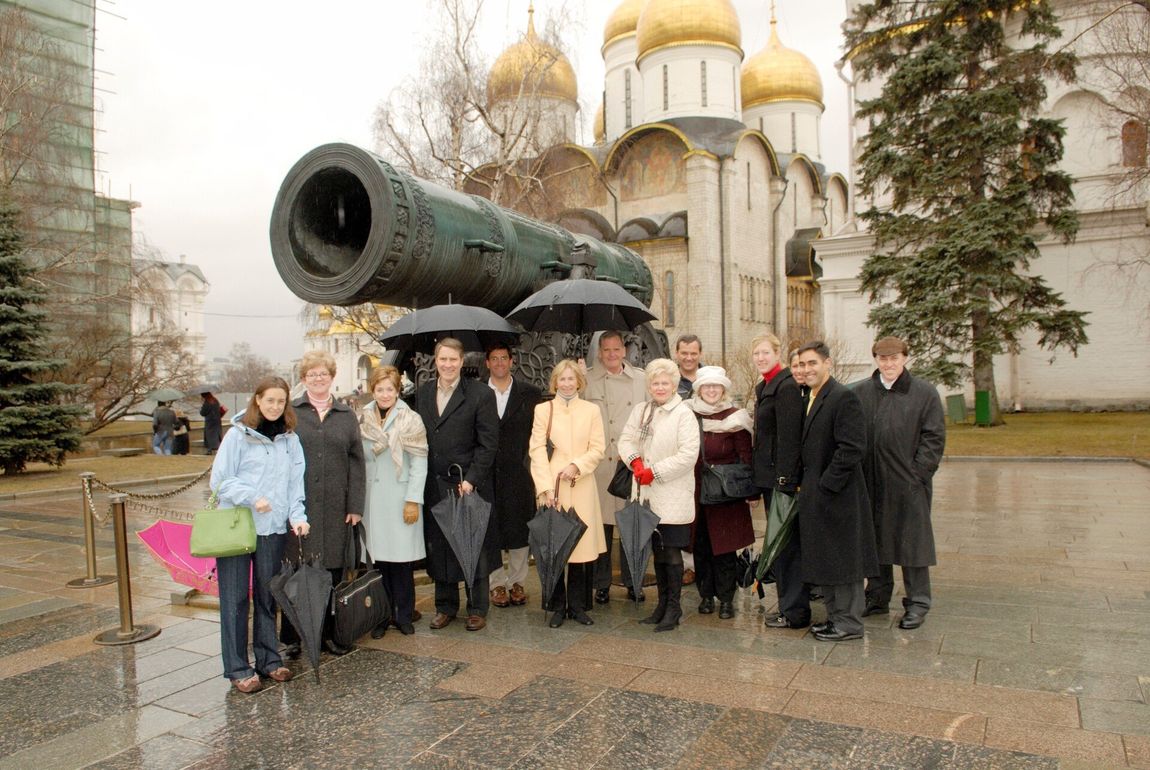
Slide title
Esper with Sen Bill Frist and Other Senators During a Trip to Moscow
Button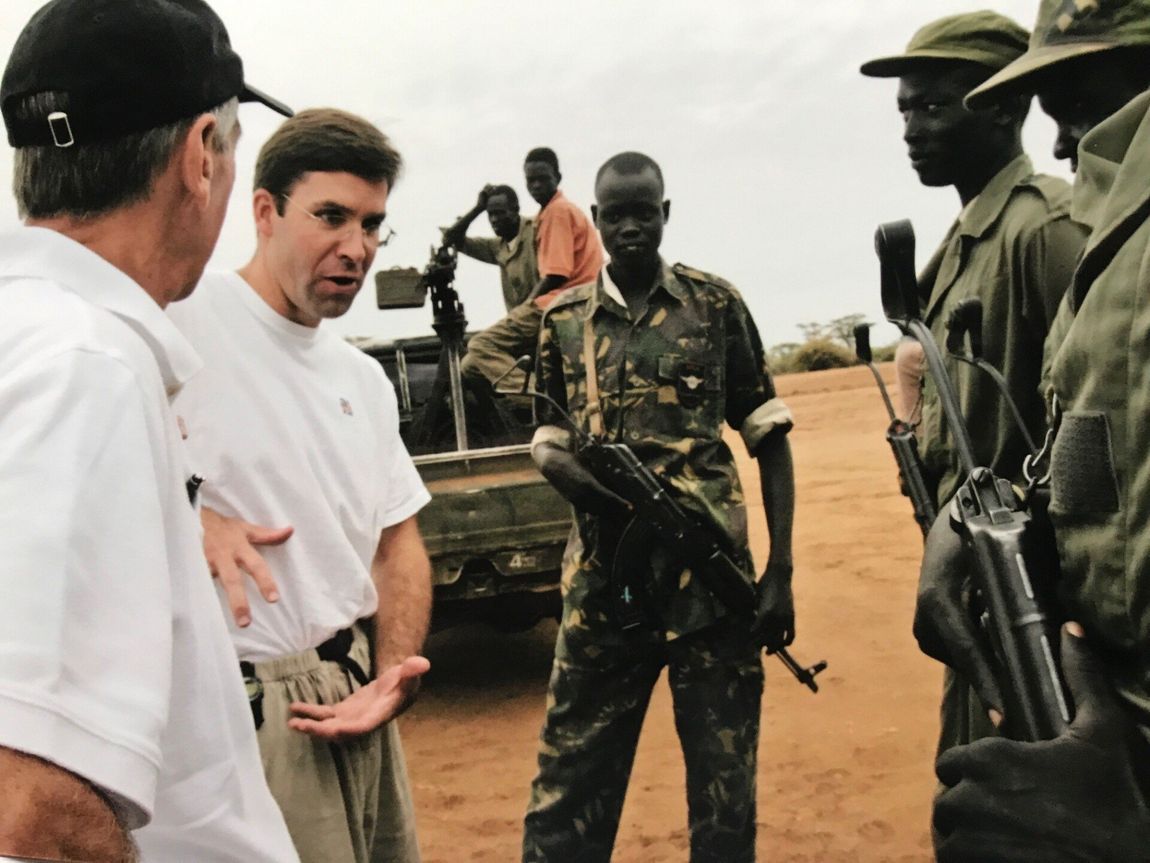
Slide title
Esper with Sen Bill Frist in South Sudan in 2005
Button
Slide title
Esper with Sen Frist in Africa in 2005
Button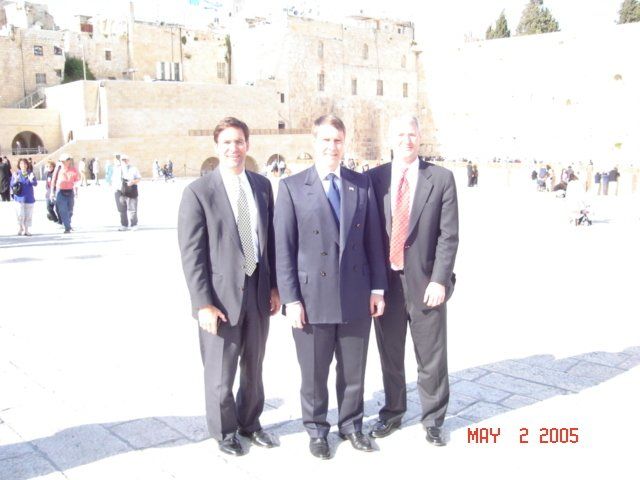
Slide title
Esper with Sen Frist in Jerusalem in 2005
Button
Private Sector
With Frist planning to retire from the Senate at the end of 2006, Esper decided to leave Capitol Hill that same year and become Chief Operating Officer and Executive Vice President for Defense and International at the Aerospace Industries Association, the industry’s premier organization representing America’s aerospace and defense companies. In this capacity, Esper advanced initiatives to expand trade abroad, improve the export control system in close collaboration with the White House and State Department, led trade missions to places like India, and worked to improve the tax, regulatory, and policy environment in the U.S. He also served on the Department of State Trade Advisory Group and the Department of Commerce Industry Trade Advisory Committee during this period.
Esper was selected by Senate Majority Leader Mitch McConnell (R-KY) during this period to serve as a Senate-appointed commissioner on the U.S.-China Economic and Security Review Commission. The Commission was in a rebuilding mode, and included a number of sharp people from both sides of the political aisle and from several key sectors. At the same time, Esper became an Adjunct Professor at the Missouri State University Department of Defense and Security Studies located in Fairfax, Virginia. He taught graduate level classes there for several years, first on the role of Congress in U.S. national security, and later on U.S.-China relations alongside Randy Schriver, who later became Assistant Secretary of Defense for Indo-Pacific Security Affairs.

Slide title
Esper on a trip to China with the U.S. & China Economic and Security Review Commission in 2008
Button
By 2007, LTC Esper had transferred from the D.C. National Guard to the Army Reserve, where he was assigned to the Office of the Chief, Army Reserve. He retired from the military in the summer of that same year after 21 years of combined service on active duty, in the National Guard, and with the Army Reserve. The three-star general in charge of the Army Reserve awarded him a Legion of Merit at his retirement ceremony on Capitol Hill.
During Esper’s time at AIA, former senator Fred Thompson decided to run for president in 2008 as the campaign of his friend and former colleague, Senator John McCain, imploded in the summer of 2007. Esper was one of the first persons asked by Thompson to join his campaign, and he would do so as the candidate’s National Policy Director. His role was to not only develop Thompson’ policy positions across all foreign policy, defense, and national security matters, but to oversee the crafting of his social, economic, and domestic policies as well. Moreover, he helped Thompson prepare for debates, write speeches and policy blogs, and worked with major media outlets, stakeholder groups, and others to advance the candidate’s agenda.
Thompson’s campaign ended disappointingly in early 2008, at which time Esper began serving as a proxy for and assisting the resurgent campaign of John McCain. Team McCain eventually asked him to serve as the staff lead on the National Security Subcommittee of the Platform Committee responsible for drafting the defense, foreign policy, diplomatic, veterans, intelligence et al sections of the 2008 Republican Party Platform.
Not long after the Thompson campaign ended in 2008, the U.S. Chamber of Commerce offered Esper the opportunity to become Executive Vice President of its Global Intellectual Property Center (GIPC). With a view toward rounding out his background in the trade and economic space, particularly in areas that drove innovation and growth, he joined the world’s largest business organization that summer. Soon thereafter, the Chamber’s leadership asked Esper to also become its Vice President for Europe and Eurasia. There was a nexus between this role and his duties as head of the GIPC that found him traveling often to Europe, especially to European Union and United Nations organizations on the continent, to work on a broad range of legal, regulatory, trade, and IP matters. The GIPC also took Esper and his team to other hotspots of IP work for the U.S. government, American companies, and innovators, such as India, Brazil, Southeast Asia, and China.
Also in 2008, Esper completed and defended his doctoral dissertation, which was entitled “The role of Congress in the development of the United States’ strategic nuclear forces, 1947-1968,” and was awarded his PhD. In March 2018, ten years later, the Trachtenberg School of Public Policy & Public Administration presented Esper with its Distinguished Alumni Award.
Raytheon Company approached Esper in 2010 and asked him to become the high-tech company’s Vice President for Government Relations. In this role, Esper and his team represented the company before government officials at the local, state, and federal level, and assisted on a broader array of international and strategy issues. Their job was to advocate on legal, regulatory, and policy matters that would help advance the United States’ national security, ensure a robust aerospace and defense industry, promote interoperability and cooperation with allies and partners, and help grow well-paying jobs across the country. While Esper led the team’s advocacy efforts for Raytheon, most of his time was spent with other members of the senior management team, meeting with business leaders across the 70,000+ person company, crafting strategic plans and operations, and running the government relations team out of the Washington, D.C. office.
Serving again
In mid-2017, the Trump Administration asked Esper to become the 23rd Secretary of the Army. It was a major step in a thirty-plus year career in the national security arena, and especially for someone who began his professional life at the age of 18 as a cadet at West Point. It was an achievement that ranked only second to his 30-year marriage to Leah and the births of their three children.
For detailed information on Mark Esper’s career as Army Secretary, and later as the 27th Secretary of Defense, click
here or go to the Tenure tab of this website.
honors and Awards
In July 2021, the George C. Marshall Foundation honored Secretary Esper with its Andrew J. Goodpaster Award, which is presented annually to "American leaders...who have served our nation in exemplary ways...[and] have exhibited great courage, selfless service, patriotism and leadership in their lives and careers."
The Ronald Reagan Presidential Foundation & Institute presented its annual "Peace Through Strength" Award -- for "those individuals whose courage and leadership in support of our nation's armed forces, here and abroad, have contributed to the security of the American people and to the advancement of freedom" -- to Secretary Esper in December 2022 (below).
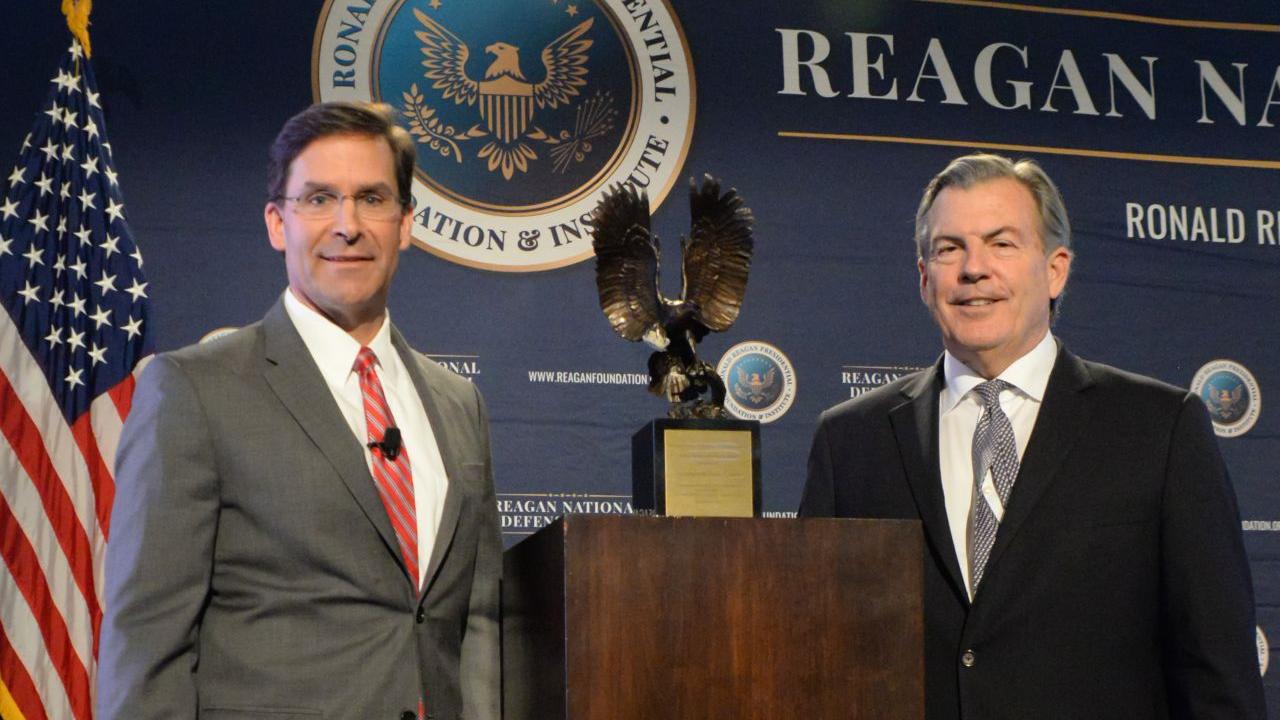
Secretary Esper was presented with the Ronald Reagan “Peace Through Strength” Award
Button
On March 22, 2023, the President of Lithuania awarded Secretary Esper the Cross of Commander of the Order for Merits to Lithuania in the capital, Vilnius, for his contributions to strengthening strategic defense cooperation between the US and Lithuania and for his efforts to reinforce security commitments in Lithuania during his tenure as the 27th U.S. Secretary of Defense.
On May 23, 2023, the PenFed Foundation presented Secretary Esper with its annual Military Hero Award for leading at the highest levels of the U.S. Department of Defense and providing our nation with exemplary vision and leadership during vital times. This video biography of Dr. Esper's life and career was shown to the gathered audience in Washington, DC, as the tee up to his award presentation.
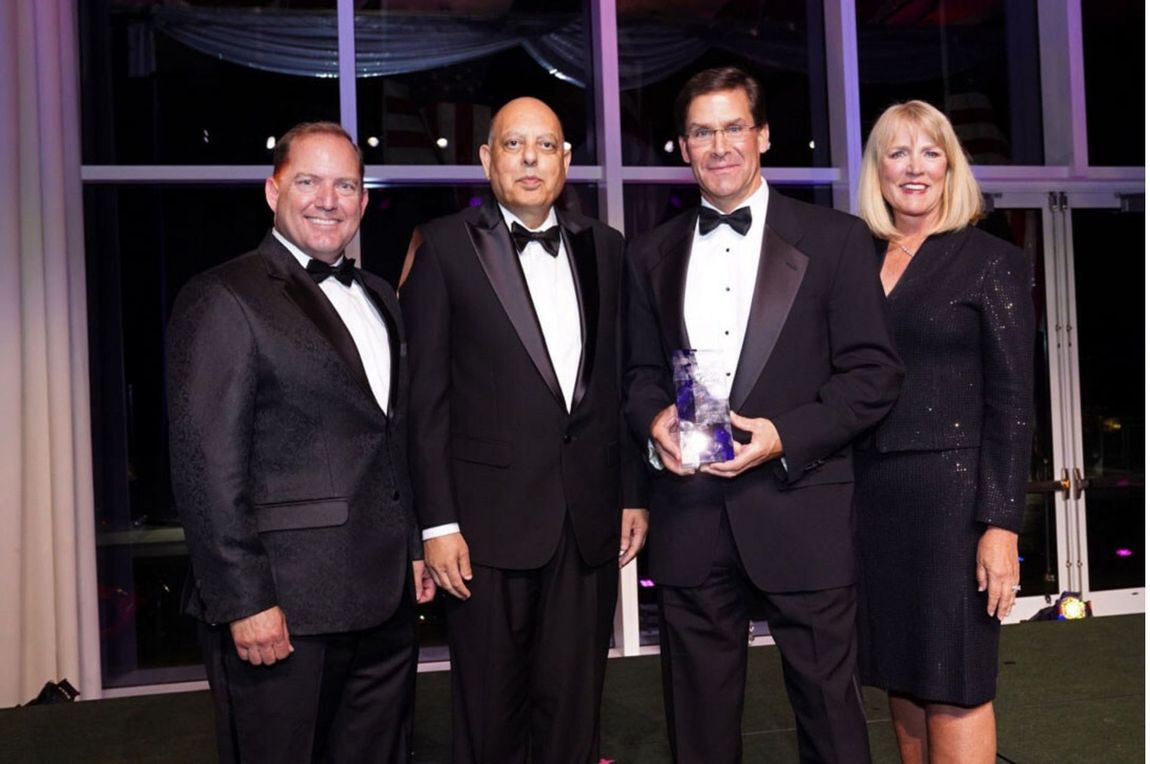
Current Work, memberships and Affiliations
Dr. Esper is a member of the Council on Foreign Relations and the Aspen Strategy Group. He is also a member of the Veterans of Foreign Wars, the American Legion, and the Avalon Action Alliance, a non-profit organization committed to helping veterans and their families.
Mark serves on the boards of the The McCain Institute, The Atlantic Council, and the U.S. Global Leadership Coalition. He is also the Distinguished Chair of the Modern War Institute at his alma mater, West Point.
Finally, Secretary Esper is a partner in the venture capital firm Red Cell Partners, where he also serves as the chairman of its national security practice.
Contact Us
We will get back to you as soon as possible.
Please try again later.

